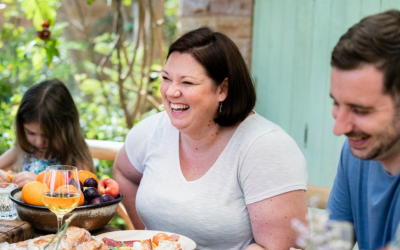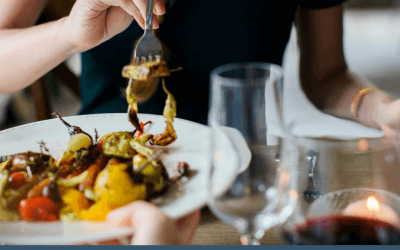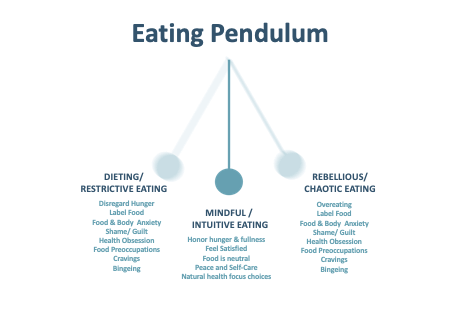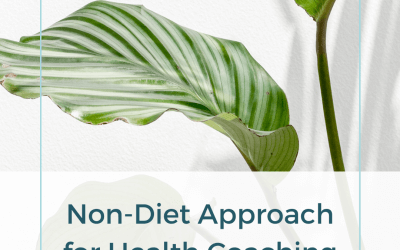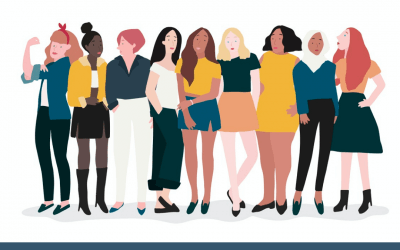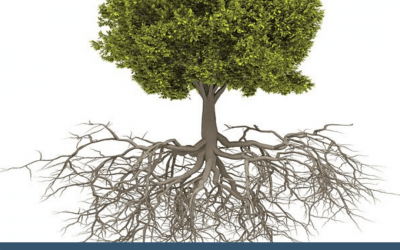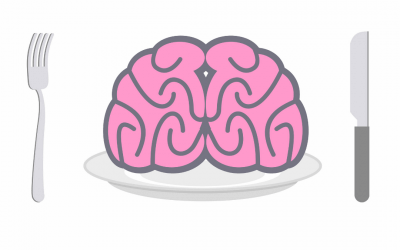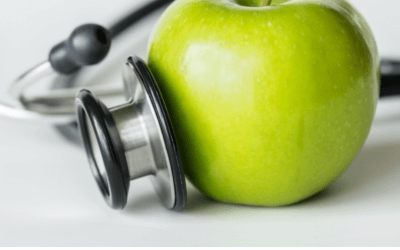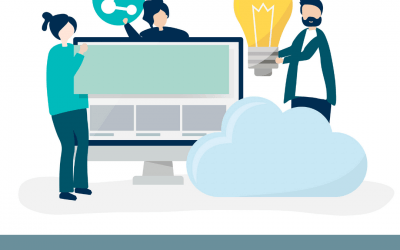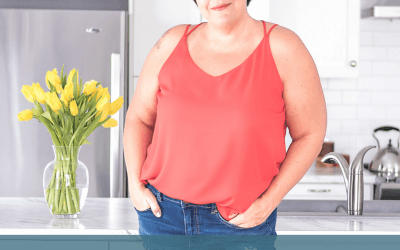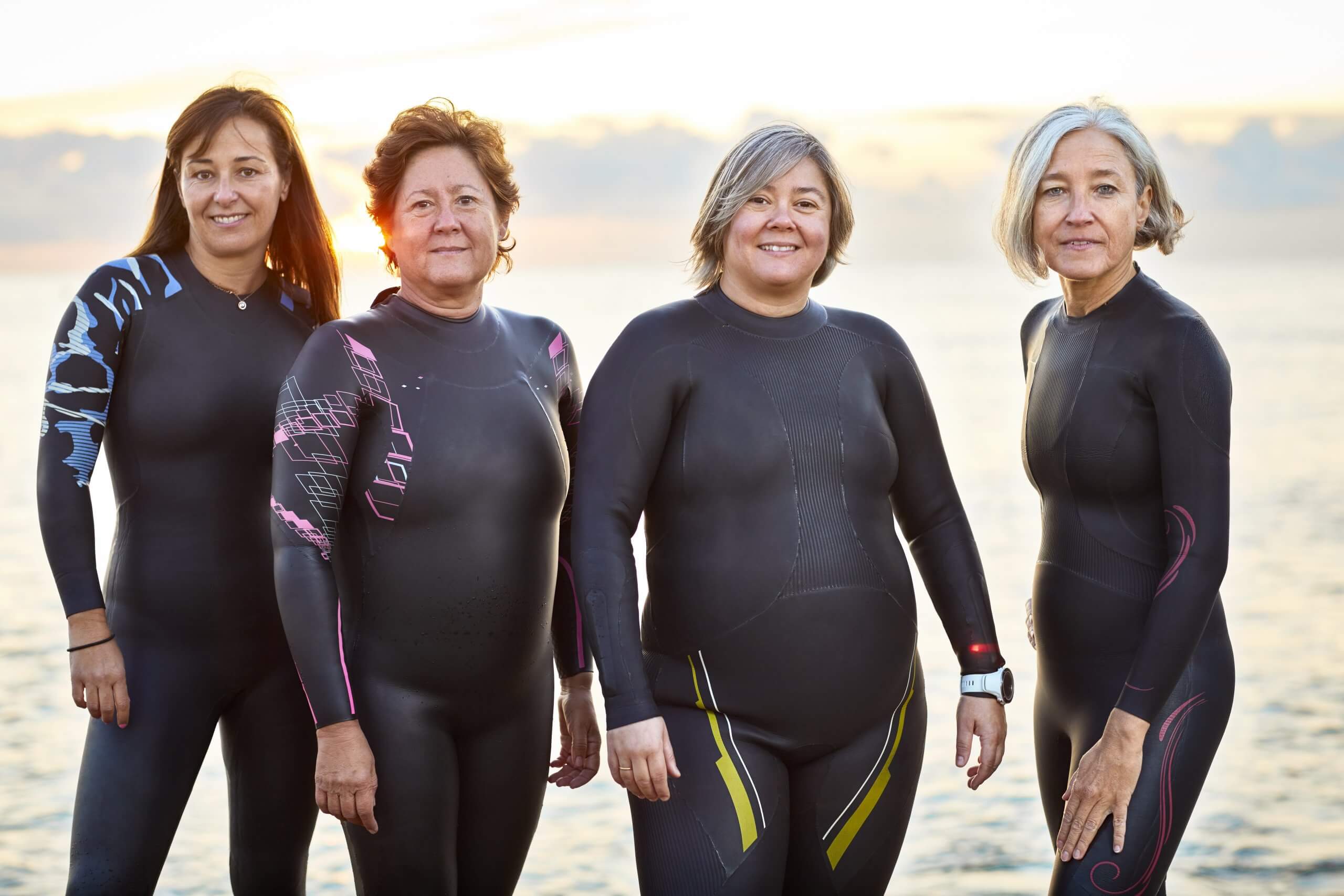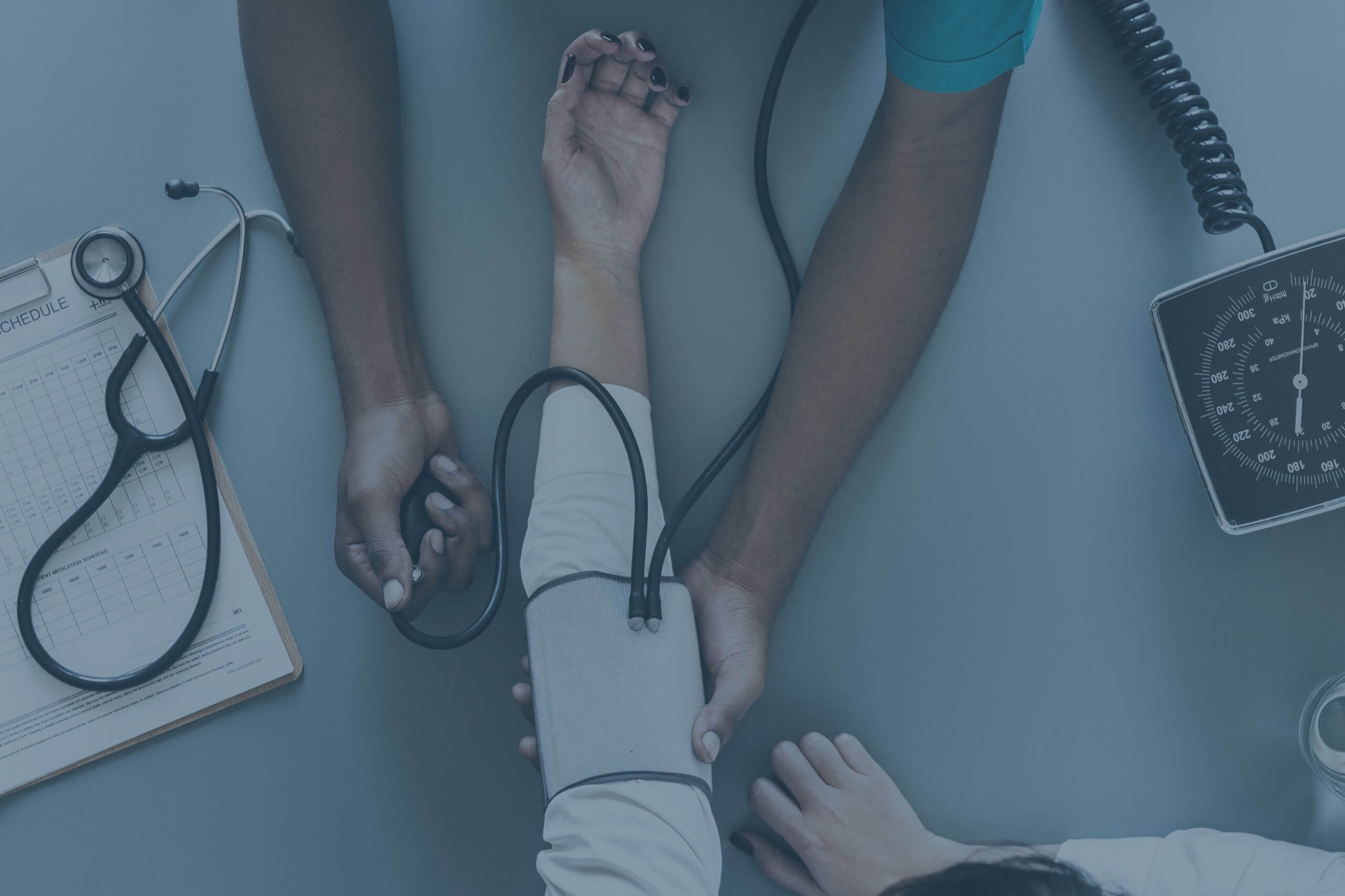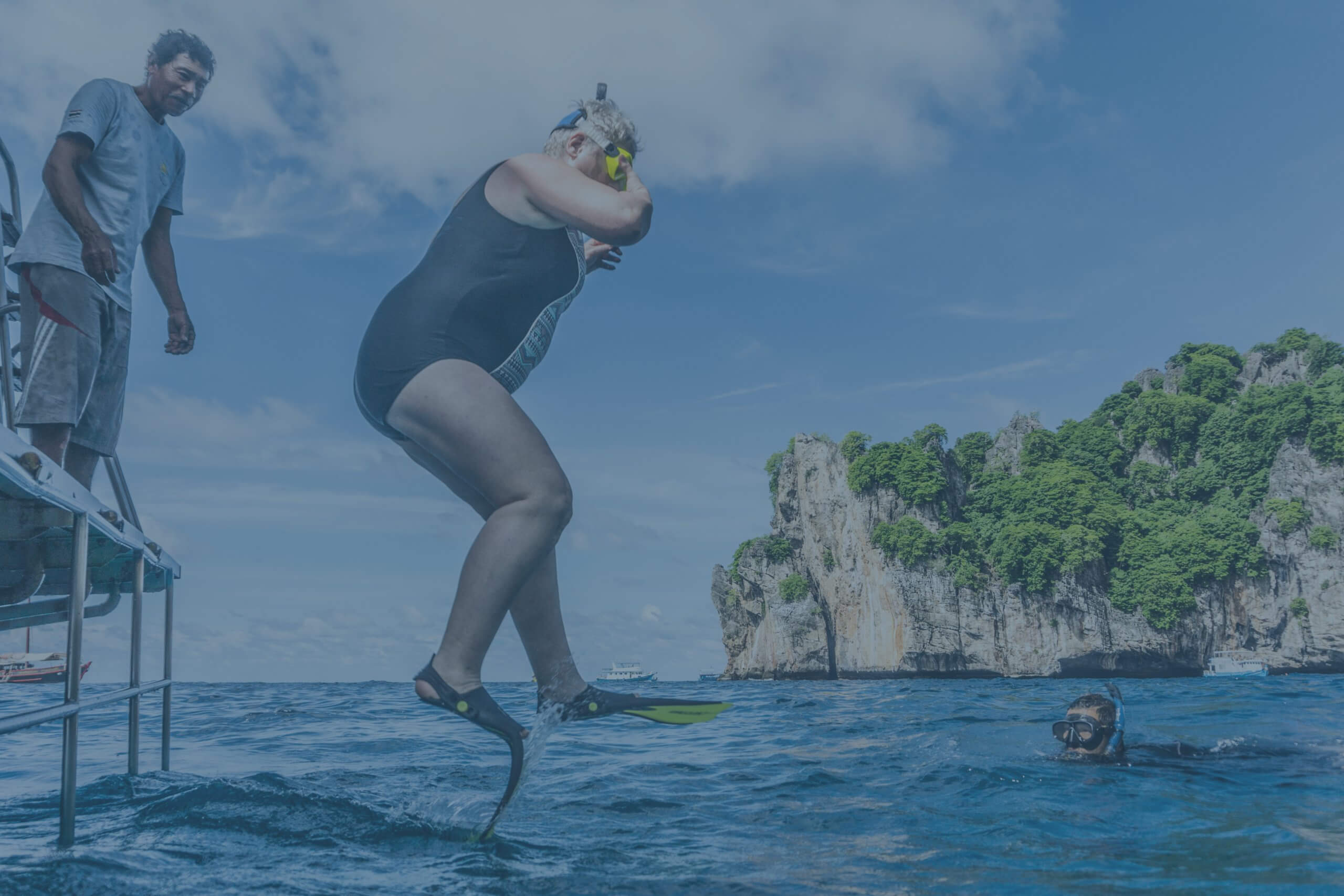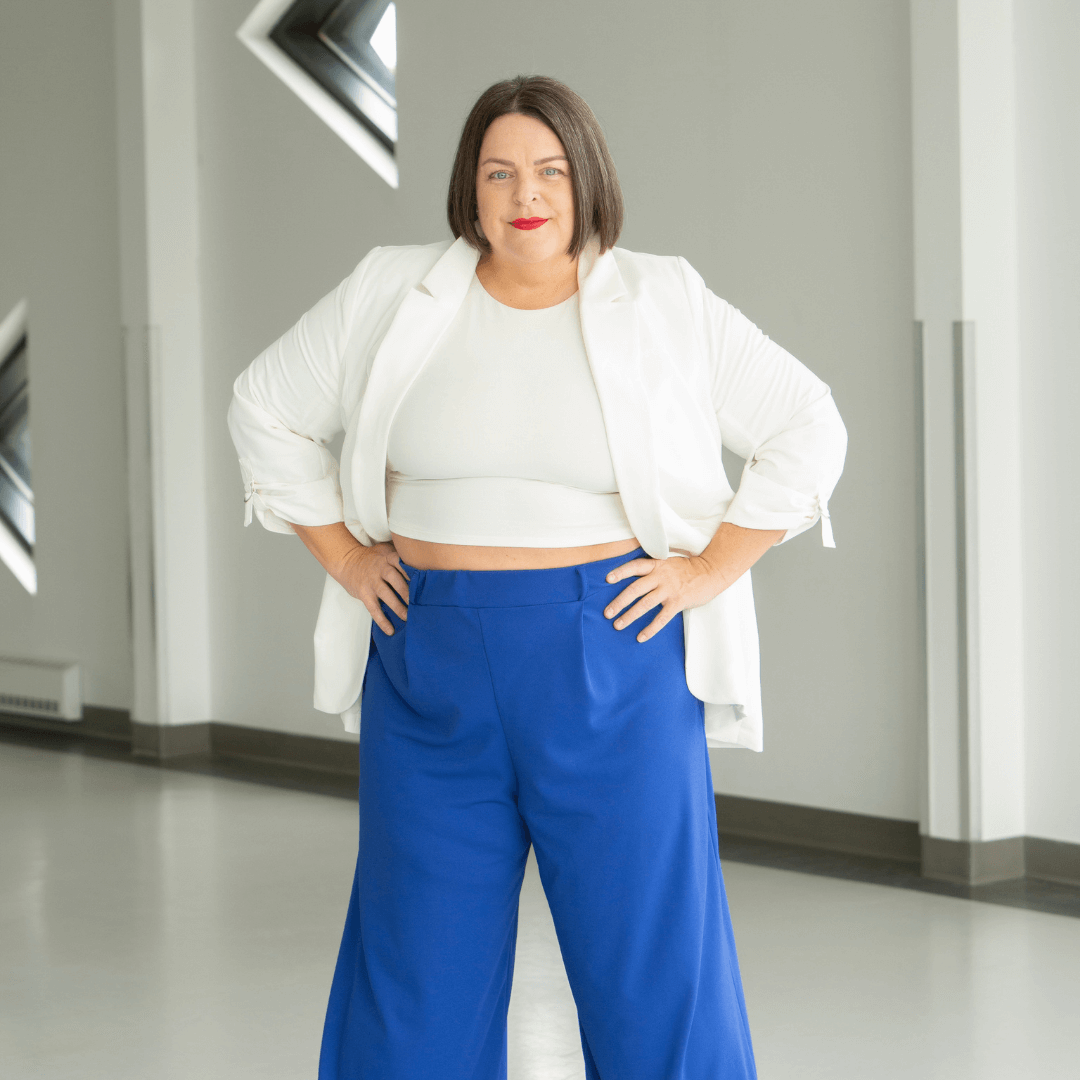

Welcome to
Beyond the Food Blog
A catalog of evidence-based articles written by Stephanie Dodier non-diet nutritionist, educator, and feminist business leader on all topics supporting the non-diet approach that will challenge everything you’ve been taught about food, health, and coaching.
Welcome to
Beyond the Food Blog
A catalog of evidence-based articles written by Stephanie Dodier Clinical Nutritionist on all topics supporting the non-diet approach to health.
Our Most Recent Articles
Where do you start to make peace with food?
Throughout my research, I’ve discovered that there is more to overeating, emotional eating and even binge eating than just food.
Most patients & students with food struggle will have body image struggle, negative mindset, overthinking behaviors. They are overwhelmed with an emotional roller coaster, lack confidence with food choices, low self-esteem. Moreover, they put their life on hold until they “lose the weight once and for all”.
This article talks about how to start to make peace with food and your body. In addition, I share how you can end the diet cycle to empower you to be your own expert. Here’s what you’re going to learn from this blog post:
How I started to make peace with food
Free resource to get started to make peace with food
How I started to make peace with food
Eight years ago, that was me. I consulted with a variety of specialists and experts hoping they would find what was “wrong” with me and that I could finally find the solution. Each appointment or purchase resulted in a few hundred $ and a new diet or protocol.
I would follow the guidelines, and yet I was always back to the starting point within weeks and months. This went on for years…
You see… There’s nothing wrong with me that could be fixed with a diet or protocol. The approach made everything worse. It compounded the side effects, made me gain more weight and have a deeper emotional relationship to food.
There’s nothing wrong with you. In fact, emotional eating, overeating eating and weight gain are part of the diet model. The diet and weight loss industry wants you to believe there’s something wrong with you because that belief keeps you coming back. Likewise, it keeps you feeling broken… keeps you feeling unworthy. That’s what we call the diet culture.
What is Diet Culture?
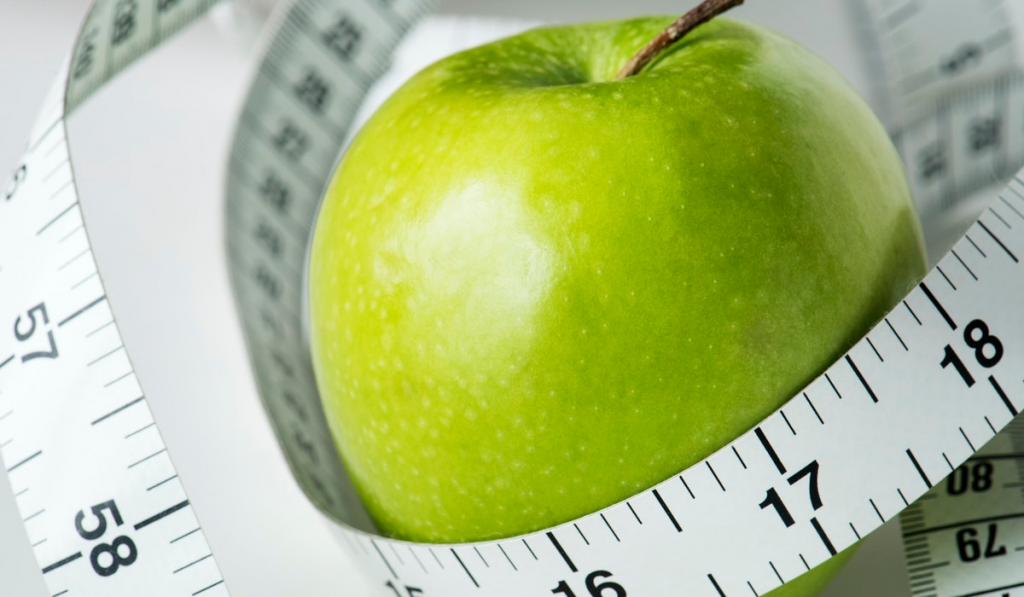

Diet Culture is defined as the worship of thinness and equating it to health and moral virtue. If you’ve been part of this culture, you might have spent your whole life thinking that you’re broken just because you don’t look like the “thin ideal.”
Diet Culture promotes weight loss as a means of attaining what it perceived to be a higher status—the thin ideal. Certainly, it oppresses people who don’t match up with its supposed pictures of health and attractiveness.
It compels you to spend a massive amount of time, energy, and money trying to shrink your body, even though intuitive eating research clearly shows that almost no one can sustain intentional weight loss for more than a few years.
The good news is, it’s just a cultural movement. Belonging to a cultural movement is completely optional and something that you can say “no” to. Most importantly, you have the power to make the choice to be free from this oppressive culture.
How to break the diet cycle to make peace with food?
Breaking the Diet Cycle is possible and will come as a result of healing our relationship to food with acceptance and compassion. Moreover, it can be achieved by seeking to heal our relationship to food, respecting our natural hunger and fullness cue and accepting our bodies.
Intuitive Eating is a proven and well-researched self-care eating framework that teaches us to have a healthy relationship to food, therefore, empowering you to trust your ability to meet your needs, distinguish between physical and emotional hungers, and ultimately, develop body wisdom.
Intuitive Eating is the most effective approach to recover from years of dieting. In fact, that’s what changed my relationship to food and body and allowed me to start living my full life right away without having to lose weight.
This is what I teach women inside our Conquer & Thrive community so they, too can make peace with food and their body, and start living their full life now. Yes, it’s possible!
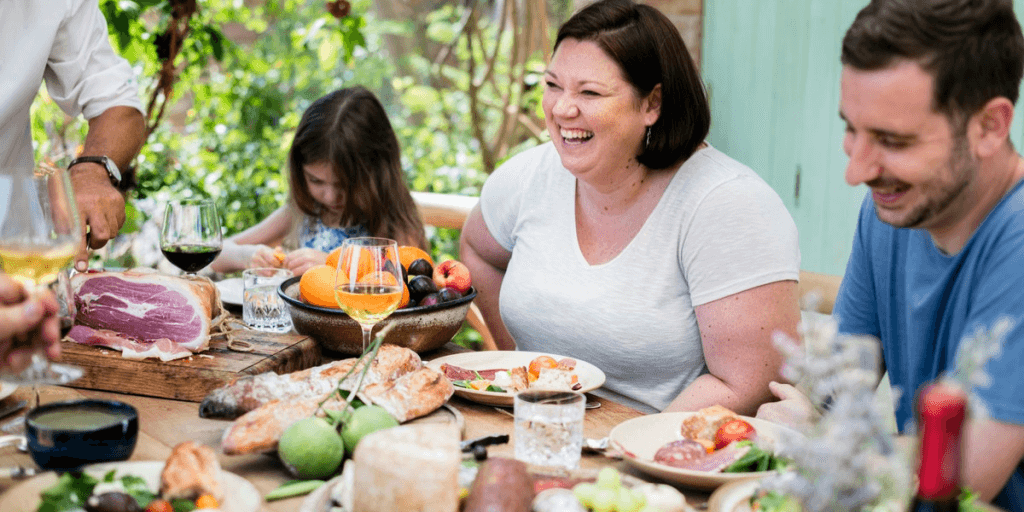

Free resource to get started to make peace with food
To help you get started to make peace with food and your body, I have created a free audio guide for you to know exactly what to do when you stop dieting, emotional eating, binge eating and body image issues. Claim your way to freedom now!
How I started to make peace with food
Eight years ago, that was me. I consulted with a variety of specialists and experts hoping they would find what was “wrong” with me and that I could finally find the solution. Each appointment or purchase resulted in a few hundred $ and a new diet or protocol.
The approach made everything worse. It compounded the side effects, made me gain more weight and have a deeper emotional relationship to food.
What is Diet Culture?
Diet Culture is defined as the worship of thinness and equating it to health and moral virtue. If you’ve been part of this culture, you might have spent your whole life thinking that you’re broken just because you don’t look like the “thin ideal.”
How to break the diet cycle to make peace with food?
Breaking the Diet Cycle is possible and will come as a result of healing our relationship to food with acceptance and compassion. It can be achieved by seeking to heal our relationship to food, respecting our natural hunger and fullness cue and accepting our bodies.
Free resource to get started to make peace with food
To help you get started to make peace with food and your body, I have created a free audio guide for you to know exactly what to do when you stop dieting, emotional eating, binge eating and body image issues. Claim your way to freedom now!
This Is Why You Struggle With Food
Whenever I meet new women and tell them about my mission of spreading awareness about how women can end their struggle with food and be at peace with food and their body without being on a diet. That we can be healthy without being thin and we can access optimal health and happiness unconditionally, women always say, “Wow, is that possible?” to which my response is…
“Yes. It’s actually our birth right, sister. You and I weren’t born to be on diet and hate our bodies.”
And then the conversation always turns to…. “Well, it’s different for me, Stephanie” or “I’m so “screwed” up when it comes to food not sure it can ever change” or “I’ve tried before”.
My answer: “First sister, there’s nothing wrong with you. The problem is not you, it’s what we’ve been taught about food and our bodies. The problem is the diet model, not you.”
This article tackles why you struggle with food and teaches you how you can make peace with food and your body. Also, I share how you can end the cycles of yo-yo dieting and empower you to be your own expert. Here’s what you’re going to learn from this blog post:
What’s the antidote to the eating pendulum swing
Innate body wisdom
You see humans were born with this innate wisdom that allows us to know what, when and how we should eat. If you have children, you know that… babies cry when they’re hungry and refuse to eat when they are full. They naturally know how to regulate their eating and accepting of their body. All of us women were once like that too, that is until we went on our first diet.
We were intuitive eaters and neutral with our bodies. Diet and diet culture did a “number” on our relationship to food and our body.
Research is clear that dieting has three main side effects:
- Short term weight loss and long term weight gain
- Major stressor to our mind and body
- Distort our relationship to food and body image
Why do we struggle with food?
I hope you’re ready for this because once you see it, you can’t unsee it.
You see, most women have been hypnotized by the societal narrative that says it’s NORMAL for women and even HEALTHY to be on a diet. (I was too for 25 years more.)
If you read that sentence and right away your brain says “Well, some diets are healthy”, if that’s you that’s a good sign that you are hypnotized, too.
I really, really, really want to get you to understand that diets do not work. But in order for me to do that, I need to show you something:
That was my life for 25 years…. dieting and then overeating. Cravings all the food I restricted to lose weight to regain the weight lost.
Diets don’t work
Studies after studies the results are clear: 95-98% of dieters regain all of their weight within 1-5 years Just like I did. Maybe just like you?
Diets don’t work because of how reptilian brain reacts to food restriction and deprivation. Our brain perceives dieting as a threat to our well-being and engage in a protective reaction. Cravings, emotional eating, overeating aren’t due to a lack of willpower or discipline rather a biological reaction.
Why does our eating swing like this? Simply our body is responding to the period of starvation (dieting) with a period of feasting. And no, we can’t get away from this primal survival behaviors hence why 95%of dieter experience it.
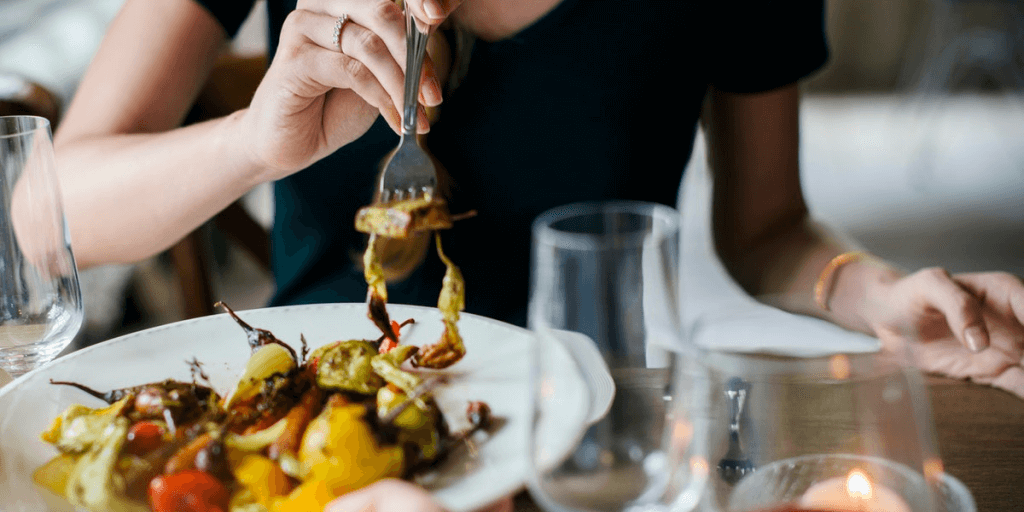

What’s the antidote to the pendulum swing?
Love. Respect and Trust.
Just as a pendulum won’t abruptly stop at center, you won’t either. You will probably swing back and forth between restriction and chaos a few times before your pendulum (mindset, feelings, thoughts, behaviors) gently settles into the middle. Is it uncomfortable? Yes, it can be. But not as uncomfortable as spending the rest of your life swinging wildly.⠀⠀⠀⠀⠀⠀⠀⠀⠀
⠀⠀⠀⠀⠀⠀⠀⠀⠀
Honour your hunger even when you’re afraid of what that means. Strive for satisfying meals even when your brain is shouting “don’t eat those carbs!” Learn to listen to your body’s natural hunger and fullness cues. Remember no food is off-limits, so there’s never an emergency to finish eating what’s on your plate.⠀⠀⠀⠀
That’s what I call Going Beyond The Food. Helping women make peace with food and body. Ending the cycles of yo-yo dieting and empowering women to be their own expert. You being the boss of YOU. Learn how we do this by joining our Conquer & Thrive community.
⠀⠀⠀⠀⠀⠀⠀⠀⠀
And know this calm and collected approach to eating is all possible for you, when you’re ready to stop restricting. 💗
Why do we struggle with food?
Most women have been hypnotized by the societal narrative that says it’s NORMAL for women and even HEALTHY to be on a diet. In short, we were socialized to be on a diet.
Why diets don't work
Diets don’t work because of how reptilian brain reacts to food restriction and deprivation. Our brain perceives dieting as a threat to our well-being and engages in a protective reaction. Cravings, emotional eating, overeating aren’t due to a lack of willpower or discipline rather a biological reaction.
The antidote to the pendulum swing
Love. Respect and Trust.
Just as a pendulum won’t abruptly stop at center, you won’t either. You will probably swing back and forth between restriction and chaos a few times before your pendulum (mindset, feelings, thoughts, behaviors) gently settles into the middle. Is it uncomfortable? Yes, it can be. But not as uncomfortable as spending the rest of your life swinging wildly.
Innate body wisdom
Humans were born with this innate wisdom that allows us to know what, when and how we should eat. If you have children, you know that… babies cries when they’re hungry and refuse to eat when they are full. They naturally know how to regulate their eating and accepting of our bodies. All of us women were once like that too that is until we went on your first diet.
Anti-Diet Training for Health Coaches
One of the frequent questions from health coaches who encounter my work in the non-diet approach for the first time is this:
How do I make money as a non-diet coach?
I get it. I had the same question 6 years ago when I first came to the world of anti-diet health coaching. If we don’t tell people what to eat, when to eat, and how to eat, what will they pay us for? Right?
Clients seeking services from a non-diet health coach have a lot they are willing to pay for: primarily ending their struggle with food and body. Helping them relearning to eat following their own eating cues instead of a “health coach” looking over their shoulder lol! Undoing all the body-shaming that “weight loss coaches” have created within them, being able to trust their own choices when it comes to health, undoing the critical mean girl voices in their head, etc…
The list could go on, but simply: undoing the work of diet culture. That’s how you make money as a non-diet health coach. If you have been through the process of unlearning diet culture yourself, you’ll know exactly what I mean. If you haven’t yet, it’s normal you don’t get it and this is the first place you need to start: doing the work of unlearning diet culture yourself.


Anti-diet training for health coaches
Starting an anti-diet coaching business
What I wish I knew before starting my non-diet health coaching business
The anti-diet approach mentorship program
Anti-diet training for health coaches
The process of becoming an anti-diet health coach starts with your own healing from years of restrictions, cleanses, detoxing, overthinking, shame and guilt. We have plenty of resources on anti-diet training for health coaches to help you take this first step along with professional training.
We have created a number of free non-diet approach training resources to help you begin learning more about this revolutionary health approach. Join my non-diet professional community by requesting our non-diet professional starter pack.
I would suggest you also subscribe to anti-diet podcast .
Starting an anti-diet coaching business
Starting an anti-diet coaching business (also referred to by some as an intuitive eating business is simple. It is the same as starting any other business: You create a product, in the anti-diet health coaching business this would be a coaching package, and you go out into the world and sell this product.
As soon as you start working with clients, you will know just how powerful your product truly is. Research is clear about the benefits of health coaching: Significant improvements in one or more of the health-promoting behaviors when interacting with a health coach. You will see the changes in your clients quickly and your confidence in your business will grow rapidly.


My anti-diet business journey
My first business in the world of health coaching was actually a nutrition clinic in Toronto Canada. Five years ago, I transitioned my health coaching business to the non-diet model and I shared the details of my business transition to the anti-diet model in season 1 of the Pro’s podcast series.
I’d like to give you an inside view into my anti-diet health coaching business more precisely what I wish I knew before starting my anti-diet health coaching business.
As I say in every episode of the Going Beyond The Food podcast: Ready? Let’s do this!
By the way, if you would like to access more details, hear my personal story that created each one of these learning head over to our podcast and listen to Season 2 Episode 2 – My Non-diet business journey episode or listen directly below:
What I wish I knew before starting my non-diet health coaching business
- It’s about helping others, not turning a profit. Profit will come naturally as you help others and live your life in your zone of genius.
- You can make a great living as an anti-diet health coach in a career helping others deeply despite what anyone says.
- 6 P’s: Proper Planning Prevent Piss Poor Performance. You need to be strategic about your business and organize yourself. What you should do is not always what you wish you could do.
- Learn how to coach people. Coaching is not – this is how I did it so that’s the way. What worked for me is not what will work for my client. Coaching is a skill.
- Create goals and apply consistent action. Show up consistently day in and day out in your business. Take one action at bare minimum daily.
- Asking for help is ok. Your client asked for you, so should you.
- Use technology so you can maximize your time being a coach. Technology can help, but don’t forget that health coaching is about the people.
- Trying to be everything to everyone is a straight road to failure. Pick a niche and become the world expert at it.
- Growing a business is not linear. There will be more downs than ups. Successful businesses don’t happen overnight. It takes time.
- Be unapologetically YOU. Don’t copy what other non-diet coaches are doing. Your clients want to work with you.
The anti-diet approach certification program
The Non-Diet Coaching Certification is a space where you can receive support guidance to become the best non-diet professional. It’s a program geared to refine your non-diet professional skills set and teach you the skills you need to build a successful business that can impact thousands of women. It will help you develop as a powerful leader and help other women come back to their power. You will learn how to harness your ability to support and help other women. As a result, you can impact thousands of other women and dismantle diet culture.
Anti-diet training for health coaches
We have created a number of free non-diet approach training resources to help you begin learning more about this revolutionary health approach. Join my non-diet professional community by requesting our non-diet professional starter pack.
I would suggest you also subscribe to anti-diet podcast and start with episode 199 and follow through up to the latest one.
Starting an anti-diet coaching business
Starting an anti-diet coaching business (also referred to by some as an intuitive eating business) is simple. It is the same as starting any other business: You create a product, in the anti-diet health coaching business this would be a coaching package, and you go out into the world and sell this product.
My anti-diet business journey
My first business in the world of health coaching was actually a nutrition clinic in Toronto Canada. Five years ago, I transitioned my health coaching business to the non-diet model and I shared the details of my business transition to the anti-diet model in season 1 of the Pro’s podcast series.
What I wish I knew before starting my non-diet health coaching business
1. It’s about helping others, not turning a profit.
2. You can make a great living as an anti-diet health coach.
3. 6 P’s: Proper Planning Prevent Piss Poor Performance.
4. Learn how to coach people.
5. Create goals and apply consistent action.
6. Asking for help is ok.
7. Use technology so you can maximize your time being a coach.
8. Trying to be everything to everyone is a straight road to failure.
9. Growing a business is not linear.
10. Be unapologetically YOU.
Ready to take the next steps
The anti-diet approach mentorship program
You can access all of our services on our work with us page. We have a number of programs and service levels enabling us to serve most women:
Free Resources and Masterclasses: Get started and get to know us better!
Private coaching with Stephanie and her team Stephanie and her team of Certified Non-Diet Coaches are waiting to support you in a one-to-one setting with an individualized plan.
Undiet Your Life group coaching program is for women to learn how to eat intuitively, become body neutral, and learn self-coaching at their own pace while being supported in a group setting by Stephanie and her team of Certified Non-Diet Coaches.
Non-Diet Coaching Certification for professionals ready to integrate the Going Beyond The Food Method™️ in their practice and for women wanting to become Certified Coach and build a business coaching other women beyond the food.
Good Money Business Mastermind A business mentorship and a collective of ambitious, driven and empowered anti-diet culture providers and coaches on a mission to dismantle diet culture and make GOOD money doing it!
Non-Diet Approach for Health Coaching
When I first started in my nutrition practice the term “non-diet approach” didn’t even cross my mind. “Anti-diet approach” didn’t even exist. Unbeknown to me, I was practicing the “diet approach to nutrition” simply because that’s what was taught in health & nutrition school.
Fast forward close to 10 years now, a lot have changed. The non-diet approach is growing rapidly, so has the anti-diet approach and intuitive eating is booming.
So, let’s discover what is the non-diet approach.
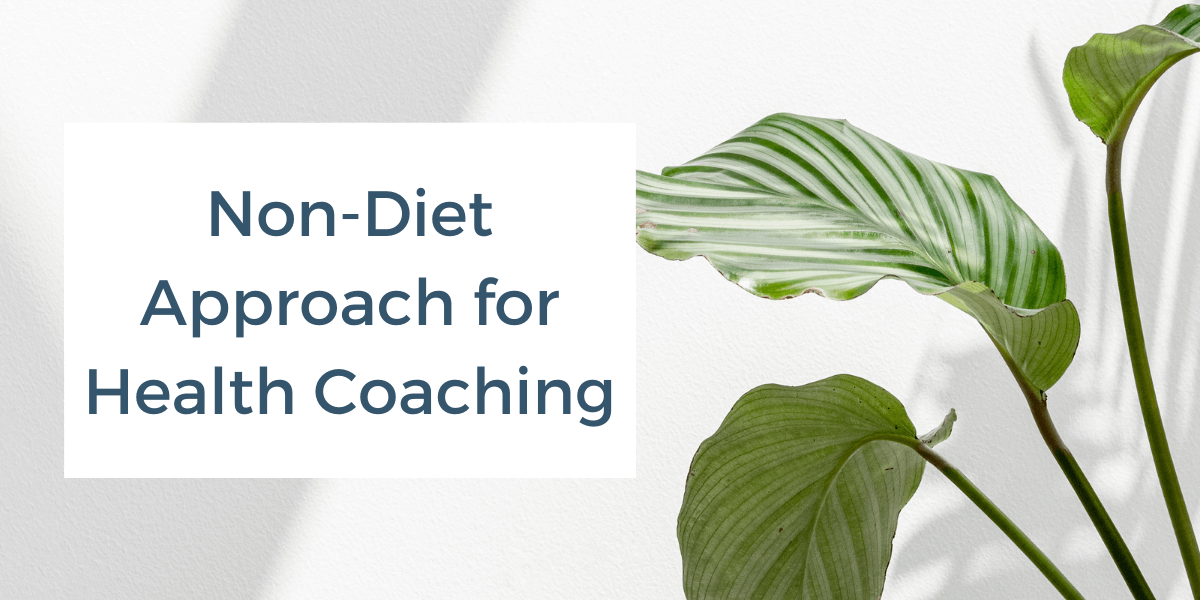

Core values of the non-diet approach
The pillars of the non-diet approach
Non-diet approach training for professionals
What is the non-diet approach?
The non-diet approach to health coaching & nutrition is the exact opposite of dieting. It recognizes that food, eating and body weight aren’t the problem to be fixed. It’s a weight-neutral approach to health instead of focusing on a weight-oriented outcome. This approach focused on all the other factors that can impact one’s health beyond body weight. In other words, the ultimate goal is to support the patients to become their own experts at their bodies.
The Going Beyond The Food Method™️ is our proprietary methodology that helps women to recover from diet culture and learn the non-diet way of life. Firstly, our 4 pillars are Body Wisdom, Body Trust, Body Respect, and Body Neutrality. Secondly, our framework is composed of 5 steps process: Intuitive eating, Body Neutrality, Self-Coaching, Emotional Intelligence, and Mindfulness.
Core values of the non-diet approach
The non-diet approach to health coaching and nutrition holds key core values: Fundamentally, it recognizes that diets do not work. It’s holistic in nature. It is focused on the Why not the What, it’s focused on finding solution that are based on love and compassion. Moreover, it believes that all humans and bodies are worthy.
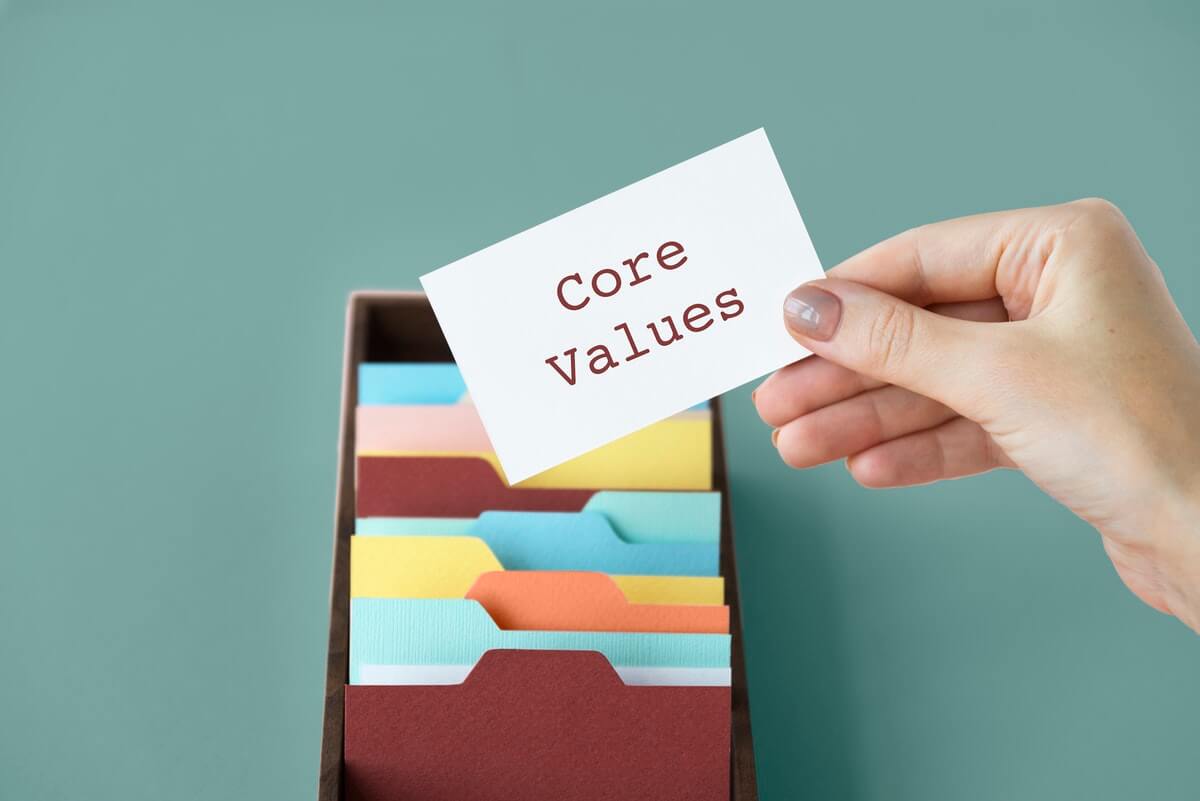

Diets don’t work
A 2016 study by researchers at UCLA studied 40,420 adult participants in the most recent U.S. National Health and Nutrition Examination Survey. Researchers looked at the participants’ health as measured by six accepted metrics (not including BMI). These metrics are blood pressure, cholesterol, triglyceride, glucose, insulin resistance, and C-reactive protein.
The study found that 47% of people classified as overweight by BMI and 29% of those qualified as obese were healthy based on at least five of those other metrics.
Meanwhile, 31% of normal-weight people were unhealthy by two or more of the same measures.
A number of research studies show that weight loss is not necessary to improve physical health. Studies have also found that fitness is more predictive for mortality than weight. This study defined ‘fit’ as 3-4 hrs per week of walking.
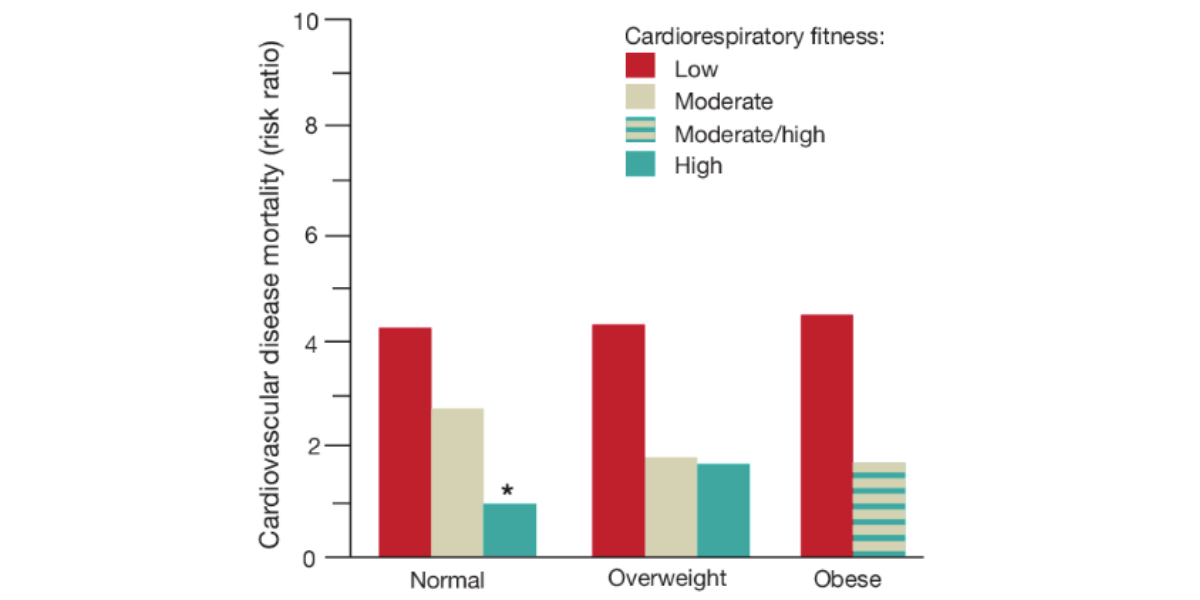

Note: “Fit” is not synonymous with “thin” or “lean.” That’s Diet Culture. Being fit means being in good health, especially because of regular physical movement.
Furthermore, trying to change your health status simply by losing weight has not only proven to be an ineffective approach but also carries potential negative side effects to your health. The focus on intentional weight loss via dieting can be harmful. Multiple studies demonstrate negative side effects of dieting behaviors. The three most documented negative effects are weight cycling, disordered eating, and weight stigma.
The non-diet approach for health coaching is holistic
The World Health Organization defines health as “a complete state of physical, emotional, and social well-being, not merely the absence of disease or infirmity.” The non-diet approach is a weight-neutral approach to health is based on the idea that your health status or risk level can’t be determined solely by your weight.
Instead it recognized that humans are more than a physical body: mental, emotional, spiritual and physical human bodies.
Its focus is on the WHY instead of the WHAT
The non-diet approach looks at the root cause of the behaviors. For example, when considering nutrition it considers why the individual is eating instead what the individual is eating. What we eat, how we eat and when we eat come second to why we eat.
Compassion versus fear-based threat
The non-diet approach will help the client switch his approach to health behavior to one of compassion for self. It will help form a relationship of respect towards one’s body helping the client to make choice based in love for body and self instead of fear (fear of disease, fear of weight gain, fear of other people opinion, etc…)
All humans are worthy; All bodies are worthy
The non-diet approach is grounded in the fact that all humans are worthy therefore all bodies are worthy. The non-diet recognizes the danger to one’s health when face with any stigma, discrimination or prejudice.
Therefore, the non-diet approach must be anti-discriminatory: anti-fatphobia, anti-racist, anti-sexist, anti-transphobia, anti-classist, non-binary, etc.
The pillars of the non-diet approach for health coaching
When practicing the non-diet approach to health and nutrition with clients, practitioners must follow a sequential order in their approach. Although adaptable in nature, some fundamental pillars must be in place
1. Investigation of belief and history
The first step is for the practitioner to have a clear understanding of the current state of their clients/ patients relationship to food and body. A number of assessments are available: Intuitive eating assessment, Body Acceptance Assessment and Dieting Impact Inventory.
Next, the practitioner will help the client understand how they go to be where they are right now using a dieting timeline. It’s very important for the patient to understand that it’s not their fault but instead diet culture.
2. Mindset & Unlearning Diet Culture
The next phase of the non-diet approach is the most important: unlearning. Unlearning the diet mindset, dogmatic beliefs about food and exercise, the thin ideal, etc..
When we trained professional inThe Going Beyond The Food Method™ our practitioners are trained in a Cognitive Behavior Therapy approach called Self-Coaching. This will be the tool they will teach their client to help them unlearn Diet Culture.
3. Attunement & Reconnecting
As the client progress in unlearning diet culture the next steps will be to help patient to reconnect with their body via body sensation. Using various mindfulness approach our graduates of our non-diet certification have a number of tools available to them to teach their client attuned with their body.
The first set of sensations we focus on with the clients are eating cues: hunger, fullness and satisfaction. Gradually, clients will be able to trust their own ability to read and interpret their innate body sensations.
4. Emotional Intelligence & Processing
As the client gets more attuned to her own innate body wisdom, the focus will shift to building skills set to process emotions & feelings. One of the most effective tools for this step is deconstruction of the eating behavior using two questions: What am I feeling? and What do I need?
The outcome of these pillars is to build emotional intelligence and shift the individual engagement with their emotions from Reacting to Responding.
5. Empowerment & Relearning
The non-diet approach is truly beyond the food and this next pillar is the reason behind this powerful transformative process.
To help build empowerment, the process of habituation will be use to help client regain power over fear foods. Gradually reclaiming their power at first with food and naturally expanding their empowerment to other part of their life using their inner wisdom.
6. Respect & Liberation
In this last step practitioner will support client in the process of rebuilding a relationship of respect with their own body. Engaging in body image healing using body neutrality and Health At Every Size approach to help build an inventory of health promoting behaviors.
At this point in the process client is also ready to re-engage with food using a gentle nutrition philosophy and with exercise using a joyful movement approach.
Non-diet approach training for professional
We have created a number of free non-diet approach training resources to help you begin learning more about this revolutionary health approach. Join my non-diet professional community by requesting our non-diet professional starter pack.
You can also listen to our non-diet podcast.
The non-diet approach mentorship program
The Going Beyond The Food non-diet approach mentorship program is a space where you can receive support guidance to become the best non-diet professional. It’s a program geared to refine your non-diet professional skills set and teach you the skills you need to build a successful business that can impact thousands of women. It will help you develop as a powerful leader and help other women come back to their power. You will learn how to harness your ability to support and help other women. As a result, you can impact thousands of other women and dismantle diet culture.


Non-Diet Approach FAQs
The non-diet approach to health & nutrition is the exact opposite of dieting. It recognizes that food, eating and body weight aren’t the problem to be fixed.
It’s a weight-neutral approach to health instead of focusing on a weight-oriented outcome. This approach focused on all the other factors that can impact one’s health beyond body weight. In other words, the ultimate goal is to support the patients to become their own experts at their bodies.
The non-diet approach to health and nutrition holds key core values: Fundamentally, it recognizes that diets do not work. It’s holistic in nature. It is focused on the Why not the What, it’s focused on finding solution that are based on love and compassion. Moreover, it believes that all humans and bodies are worthy.
1. Investigation of belief and history
2. Mindset & Unlearning Diet Culture
3. Attunement & Reconnecting
4. Emotional Intelligence & Processing
5. Empowerment & Relearning
6. Respect & Liberation
We have created a number of free non-diet approach training resources to help you begin learning more about this revolutionary health approach. Join my non-diet professional community by requesting our non-diet professional starter pack.
You can also listen to our non-diet podcast.
The Going Beyond The Food non-diet approach mentorship program is a space where you can receive support guidance to become the best non-diet professional. It’s a program geared to refine your non-diet professional skills set and teach you the skills you need to build a successful business that can impact thousands of women.
Feminism and Diet Culture
Statistics may vary to the exact % but one thing is clear: most women are dissatisfied with their body.
Research released by Dove, for their ‘Self-Esteem Project’, found that 96% of women in the UK reported feeling anxious about the way they look, compared with 86% in China, 72% in Brazil, and 61% in the US. Only 4% of the women in all the countries surveyed would consider themselves ‘beautiful’, and by the time girls reach 17, 78% will be ‘unhappy with their bodies’.
Women don’t diet because they enjoy dieting. Women who diet do it because they think they have to. These women think they are their body, thus, their bodies’ ability to meet the diet culture expectations define their worth.
Helping women leave and recover from diet culture is a feminist issue.
Why a non-diet approach for women?
The intersection between diet culture & women history
Women socialization to diet culture
Women internalization of diet culture
Non-diet Approach for women Professional Training
Non-diet Approach for women mentorship
If you would like to listen to the article in audio format the Going Beyond The Food Show
Links mentioned in the episode…
Non-Diet Coaching Certification
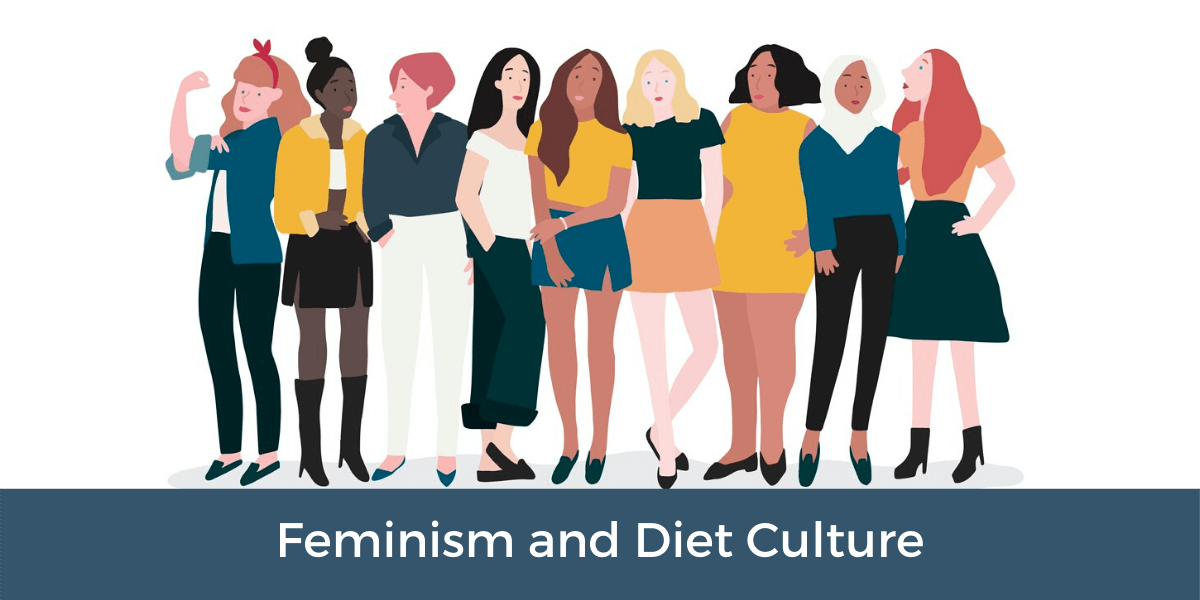

feminism and diet culture
Why a non-diet approach for women?
When women first seek to stop dieting, they think they need to “fix” their “food issue”. After years of dieting they’ve been told in many different ways that the issue was them, not the food. That if they could eat “normally” they would finally achieve their “normal body”. Sounds familiar?
It’s normal that your future client thinks like this… that’s all they’ve ever known. They’ve spent their life wondering why they struggle with food and if they could only “fix what’s wrong with them and food,” life would unlock their dreams.
The truth is: they have no issues with food. In fact, as we discovered in S1 EP 1 Intuitive eating Mentorship – First do no harm for us, as practitioners, to validate their thoughts about food and them being the issue can cause more harm. The way they engage with food now is the result of the restriction of dieting. Dieting is the issue not food. But why do your clients diet? As we’ve learned in the last episode: fatphobia: the fear of fatness.
A weight-neutral approach to health
The non-diet approach helps clients stop dieting, make peace with food and body image. It’s a weight-neutral approach to health that helps people reconnect to their innate power and become their own expert at their bodies.
Although the non-diet approach is gender-neutral, I believe that a segment of the healing approach should address the specific forces pulling at each gender/ sex: Cis-women, Cis-men, Trans, Genderqueer, non-binary, etc… I believe that each gender should have non-diet professionals that understand the specificities and struggle for each group for the best care.
The Going Beyond The Food Method™️ is for people that identify as women. I created this methodology based on my experience as a cis-woman over the last 45 years. As a person in a women’s body who has been exposed to the force of patriarchy and its attempt to control me as a woman and my body.
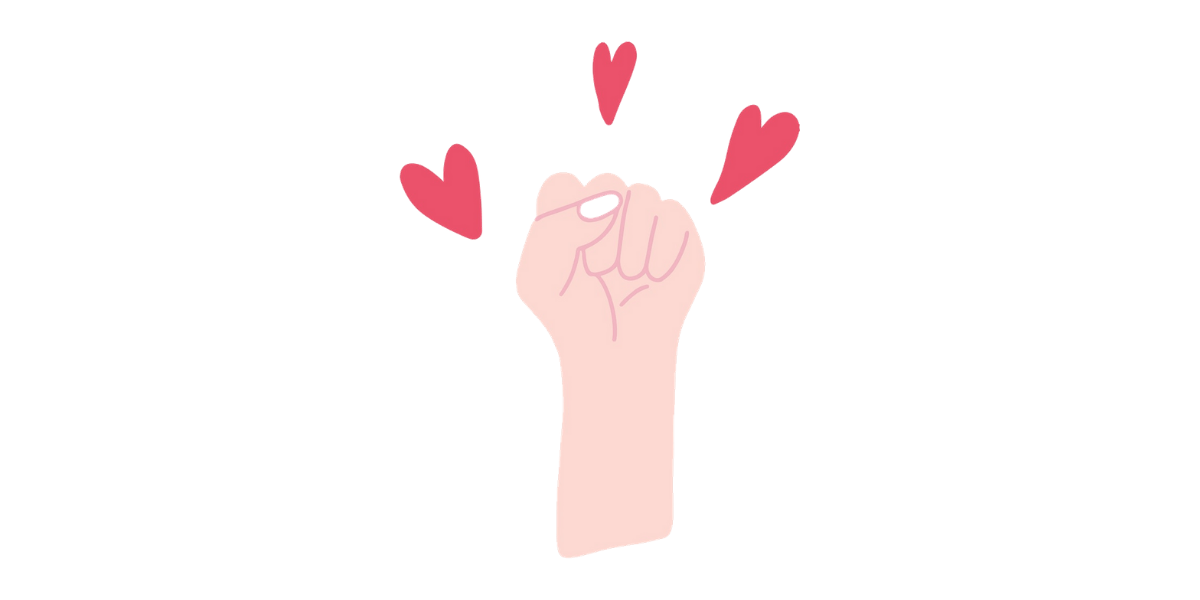

feminism and diet culture
Feminism & diet culture
First, let’s take a step back and understand patriarchy. Patriarchy is a social system in which men hold primary power and predominate in roles of political leadership, moral authority, social privilege, and control of properties. Patriarchy views men as dominant and women as submissive.
One of the many ways in which patriarchy attempts to dominate women is by exerted forces that dictate how women handle their bodies: reproduction, sexuality, beauty, and yes, body size and shape.
Most recently over the last 100 years, Diet Culture has become the cultural form of oppression on women’s bodies. Diet culture judges women’s worth based on their physical body size and looks. It assigns moral values to the ability of women to meet up with their standards.
The diet culture keeps women focusing on their bodies. Dieting keeps women distracted on food, exercise, and trying harder at restricting instead of using their innate resources to achieving much more important things in their life. Given that the tools proposed to women to achieve their “ideal body according to patriarchy” doesn’t work, it keeps women thinking they are the problem and not the diet. Women keep doubting themselves, their abilities, their capacities, and their obsession with trying to make up for what they are told are a personal failure to achieve the “good enough body”.
It is my belief as a health professional that women must understand why they “chase” a smaller body to their healing and recovery. For women, to truly liberate themselves from diet culture and its chain, they must know why society created it in the first place.
The intersection between diet culture & women history
If you look through history, their beauty or body didn’t always control women. Instead, their ability to procreate and religion controlled women. It’s not until recently that women’s bodies became the center of attention.
The mid 19th century
The feminist movement was beginning to form as women gain access to education. Women involved themselves in the abolition movement and women continued asking for their own political power. As women become more vocal and demanding more power, patriarchy responded with pressure on women’s bodies to be smaller.
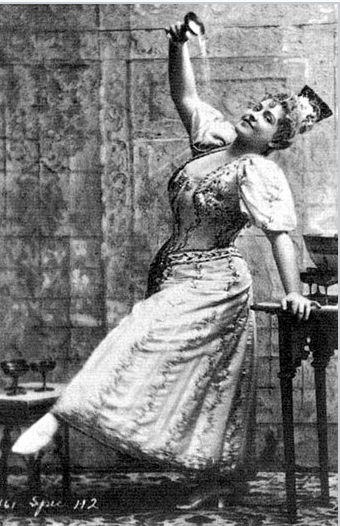

feminism and diet culture
The Gibson Girl
The Gibson Girl was born in 1880. This was the personification of the feminine ideal of physical attractiveness as portrayed by male artist Charles Dana Gibson. This body female ideal was heavily promoted and published via the new magazine and printing industry. So, ensure product advertisement ways to look like Gibson’s girl: beauty products, pills, cream, arsenic pills, etc…Diet culture was born. This period also introduced ready-made clothes and women needed to “fit” clothes when up to then clothes were made to fit women.
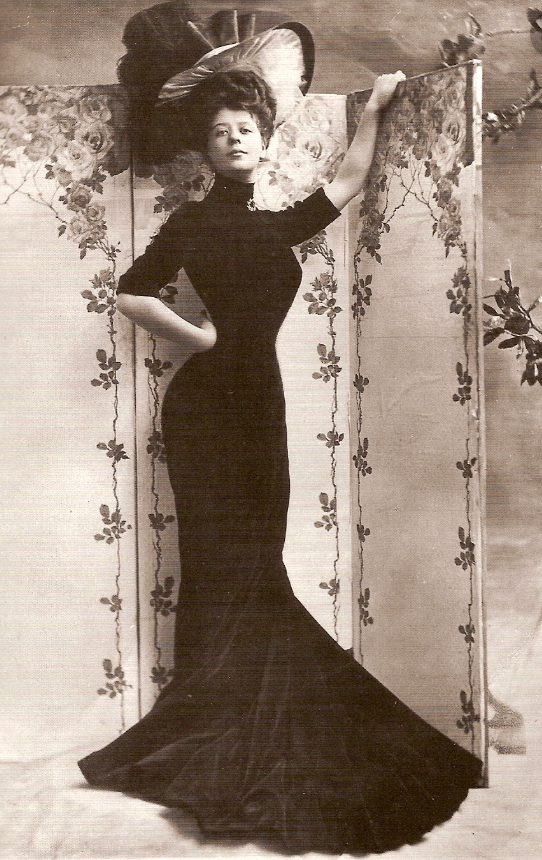

feminism and diet culture
The Flapper girl
As the suffragette movement began to gain the right to vote in many countries, the Flapper girl was born. Women became “liberated” from the Gibson girl corset only to find themselves binding their natural feminine curve into the linear look of the 1920’s. Thinness was a sign of “perceived freedom” for women. This solidified the diet culture.
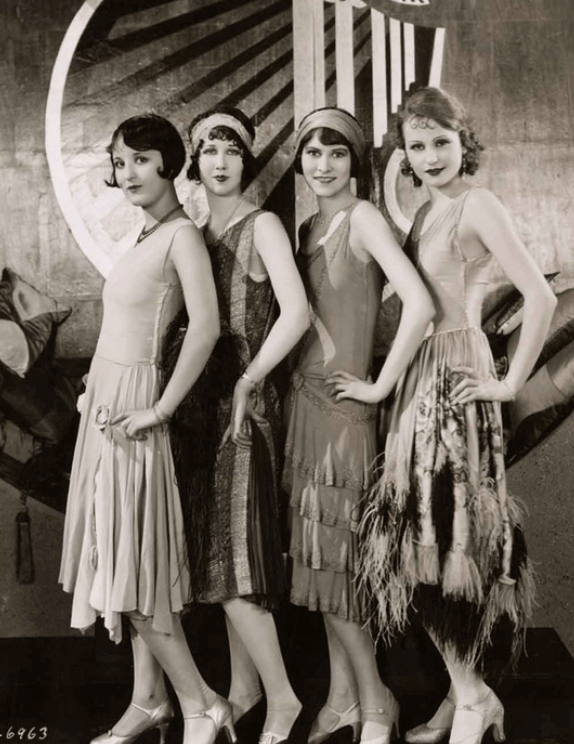

feminism and diet culture
Twiggy
With every gain in socio-economic power, women gained a smaller and smaller body ideal. Whereas the first-wave feminism in the early 90’s focused mainly on suffrage and political power, the second-wave feminism that began in the late 1960’s was focused on equality issues. That’s when Twiggy became the first supermodel; willowy, thin, adolescent physique.


feminism and diet culture
The 80’s
In the 80’s as women affirmed their new equality, came the low-calories, low-fat, and aerobic era with Jane Fonda as the leader. Calories counting began and this is when women became obsessed with dieting.
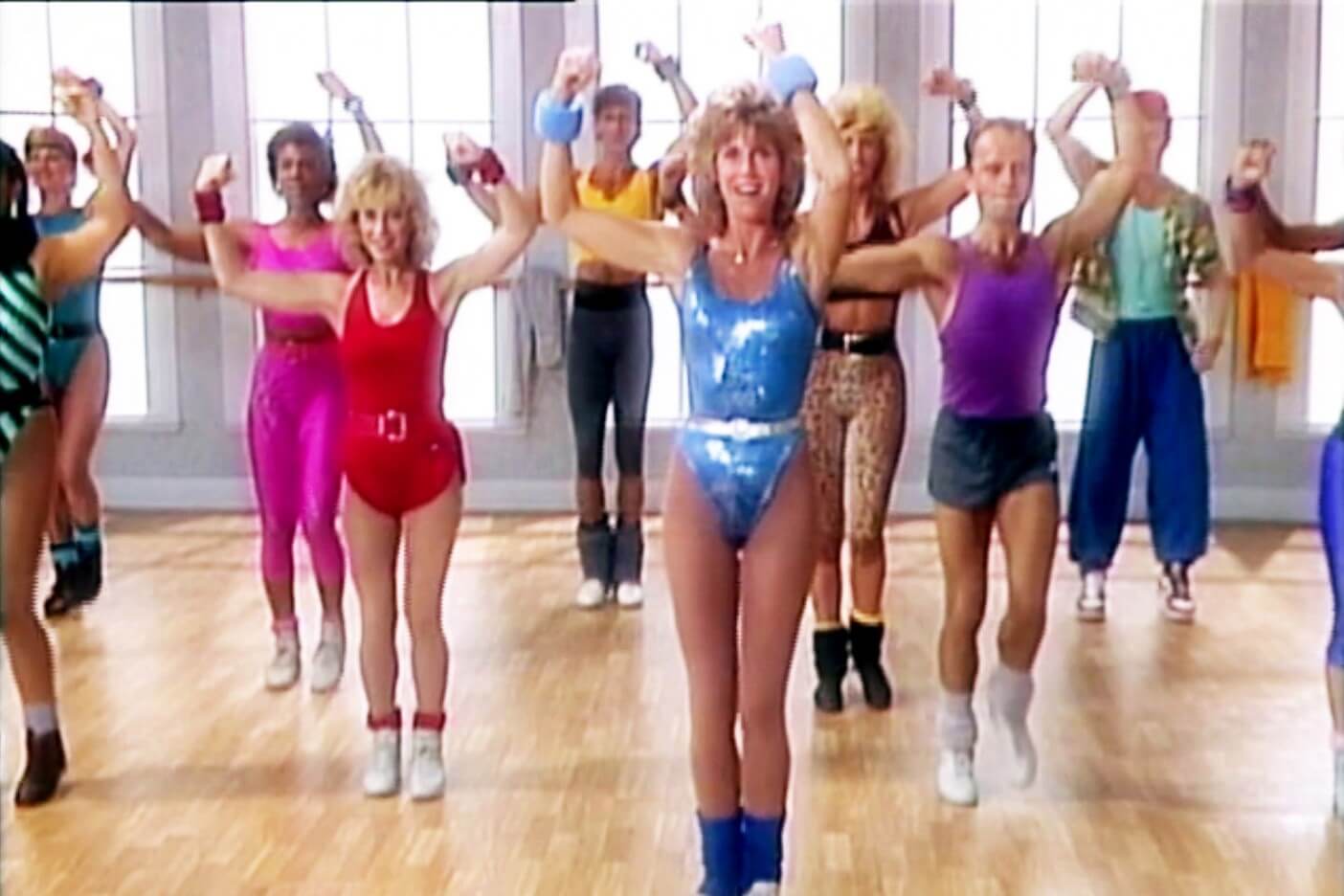

feminism and diet culture
And it continues up to today. The 90’s saw Kate Moss as the body ideal for all women. With an even smaller body than Twiggy, women’s ideal was body waifish, extremely thin described as “Heroin Chic”. The ’00s saw the Victoria Secret angels, and today we have the influencer healthy body ideal throne by the Kardashian.
“A culture fixated on female thinness is not an obsession about female beauty, but an obsession about female obedience. Dieting is the most potent political sedative in women’s history; a quietly mad population is a tractable one”
– Naomi Wolfe
Women socialization to diet culture
Socialization is the process of internalizing the norms and ideologies of society. It may lead to a desirable outcome and in certain aspects of life ensure our survival.
Socialization to diet culture and female body ideal happens at a very young for women. When were you gifted your first Barbie?
Among many societal behaviors, Their body, their beauty, and being a “good girl” defined women. Society conditioned women to please using their bodies. While society defined boys to be strong, intelligent, and non-emotional.
Most women who diet chronically today encountered their first diet in their early teens. They first observed their female caregiver being “dissatisfied” with their body and dieting. As these women entered their puberty and began awakening to being attractive, they engage with their first diet. Worse, some women experienced diet before the age of 10 as their parents wanted to prevent the “shame” of being in a non-conventional body.
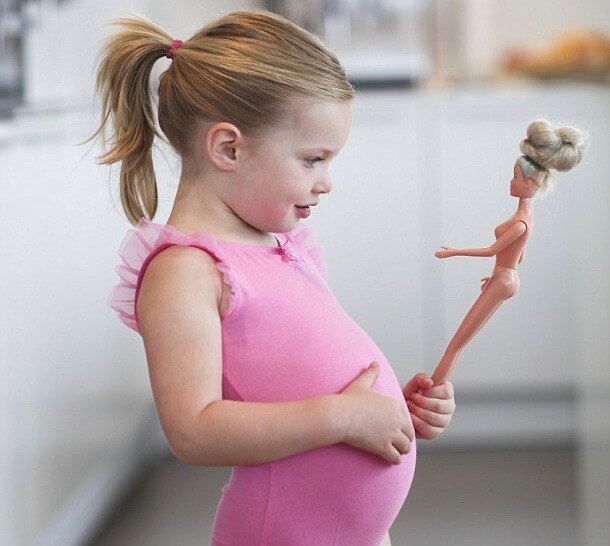

feminism and diet culture
Women internalization of diet culture
The process of internalization pertains to the person’s acceptance of a set of norms and values established by others and learned through socialization.
Women internalized diet culture in their teens leading to adulthood. This is when of having to please, as a woman, using among other things our body moves from outside of our own mind to being part of our own mind. At that point, diet culture has shaped who we are as a woman.
As we discussed in a previous article Non-diet Approach: Addressing the root cause, fatphobia is at the root as to why women diet. The process of diet culture internalization leads women to be fatphobic. They fear of being fat. They fear others judging their body as a fat body. It’s said that women fear weight gain more than illness.
Women’s fear of being in a non-confirming body is validated daily. Hundreds, if not thousands of times, marketing images and words, social media, conversation with other women, medical treatment, the beauty industry, etc… remind women that they should fear to be in a non-thin ideal body.
To cope with this constant pressure, women adapt. Diet Brain is a term I coined that best expresses how women adapt to diet culture socialization and internalization. To adapt, women become people-pleasers, we expect perfection for ourselves in the hope to offset our inability to be in a confirming body ideal. While the solution to achieve this thin ideal, “dieting” has a 91-95% failure rate, we blame ourselves for it not working so we adopt an “All or nothing” mindset when it comes to food and health.
This adaptation process is unique to people identifying as women and is the reason why Non-Diet Coaching Certification is essential for health professionals helping women recover from diet culture.
“Your dislike of yourself is a side effect of the POISON you are being fed. None of this messaging is real. Your inner bully has learned the lies society fed it, and is giving you fake news about your looks, your value, your worth, your right to be happy. I’m so sorry you have to deal with this crap. Diet Culture is just making you hate yourself for a profit”
– Naomie Wolfe
Dieting is a feminist issue
Opting out of diet culture as a woman is more than simply stopping dieting. It’s a feminist act. When we stop buying into the diet culture definition of what being a woman is, we reclaim our power back. We say no to being our bodies. We say yes to trusting and respecting ourselves first.
Helping women recover from the diet culture must include the education to how we got to be where we are today as women. That we were capable to feed ourselves, to care for ourselves, and to be more than our bodies. The socialization and internalization of diet culture are what created the beliefs that lead us to dieting and trying to fit in using our own body against ourselves.
One of the paths to reclaim our power from the diet culture can be with intuitive eating. Using our source of shame, that is food, can actually rebuild a relationship of trust and respect towards our own selves. As we reconnect to our innate body wisdom, we get to witness the power that is within us.
As we build confidence in our innate capacity to feed ourselves, we can continue to use diet culture source of shame to regain our power as women. Healing our body image and crafting a new way to be in our human body shell is not only necessary but very empowering.
“If your self-esteem is dependent on external result, you have given all your happiness and agency away. It’s an exhausting, and powerless way to live.”
Women empowerment
Individual autonomy is this idea that refers to the capacity to be one’s own person, to live one’s life according to reasons and motives as one’s own and not the product of manipulative or distorting external forces.
Leaving the jail of diet culture is a revolutionary act for women to not only be autonomous but to claim their power back from a patriarchal society that suppressed our empowerment.
In today’s society, the greatest punishment is to take away people’s autonomy and freedom by sending them to jail. Diet culture has taken women’s autonomy and freedom. Diet culture robs women of the capacity to be in their now body, to feed themselves naturally, to wear clothes they desire, to decide their own beauty standards, etc…
Helping women recover from diet culture is truly about empowering women to live their full life today… unconditionally. Choosing to accept your body is hard but doing hard “things” is what builds confidence in women… not body size. Saying ‘no’ to outside control and ‘yes’ to inner power is what builds self-esteem in women, not beauty.
Non-diet Approach for women training
The non-diet approach is the exact opposite of dieting. It’s a weight-neutral approach to health and nutrition that empowers women to become the expert of their own body. That shifts women from being their body to supporting their body so they can live their full life… right now!
The Going Beyond The Food Method™️ is our proprietary methodology that helps women to recover from diet culture and learn the non-diet way of life. Firstly, our 4 pillars are Body Wisdom, Body Trust, Body Respect, and Body Neutrality. Secondly, our framework is composed of 5 steps process: Intuitive Eating, Body Neutrality, Self-Coaching, Emotional Intelligence, and Mindfulness.
You can learn and transform your life with the Going Beyond The Food Method with our signature program.
Non-Diet Coaching Certification was created for providers and coaches wanting to deliver the Non-Diet Approach in their practice following the Going Beyond The Food Method.
Want to know if the Non-Diet Approach and The Going Beyond The Food Method can be of support to you? Get my starter pack and complete the three assessment: eating, body image and mindset.
You can also listen to our non-diet podcast.
Non-Diet Approach Certification program
The Going Beyond The Food non-diet coaching certification program is a space where you can receive support guidance to become the best non-diet professional. It’s a program that will refine your non-diet professional skills set to empower women and teach you the skills you need to build a successful business that can impact thousands of women.
It helps you develop as a powerful leader and help other women come back to their power. You learn how to harness your ability to support and help other women. As a result, you can impact thousands of other women and dismantle diet culture.
The Non-Diet Approach: What is it exactly?
But is the non-diet approach addressing the real root cause?
In the first three years of clinical practice, I thought I was addressing the root cause of my patient health concerns. I was asking a lot of questions and doing an in-depth assessment. My goal was uncovering the “real issue” that no other health professional had identified yet. This unidentified root cause was, as per my training in functional medicine, the reason why my clients were “still struggling”.
As I shared in Intuitive eating Mentorship – First do no harm although my patient had short term reliefs…. long term, their health wasn’t better. In fact, in many cases, it was worse.
So, was I really addressing the “real root cause”?
Why healing the root cause is so important
The Non-diet Approach Professional Training
If you would like to listen to the article in audio format, here’s Undiet Your Coaching Podcast Ep 5
Links mentioned in the episode…
Non-Diet Coaching Certification Program
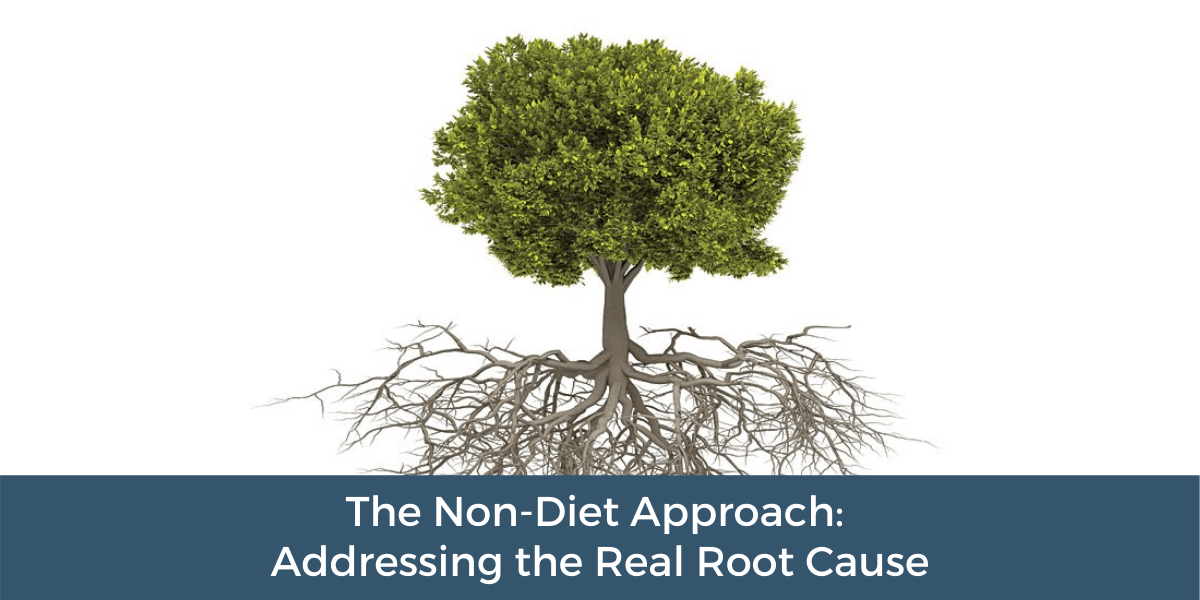

What’s the root cause?
In my training in holistic health & functional medicine, we are trained on addressing the underlying or root cause of chronic disease, taking into account the whole person including their environment, genetics, and lifestyle factors. Addressing the root cause is a fundamental philosophy, and honestly, the pride of alternative health approaches: resolving the root cause vs. just dealing with side effects.
Even beyond the health sector, the root cause is the cause of a problem. If adequately addressed, it will prevent a recurrence of that problem. By asking the question “why” a few times, the root cause of a problem is often identified as a procedural, or management, shortcoming.
For example, imagine you have a lot of weed growing in your lawn. If you remove the weed using a lawnmower, will that solve the problem? Temporarily, yes. Visually, your lawn looks good. However, you probably know that this is only at the surface level. After a short period of time, the weed will grow back. So, how do you fix this long term? If you replied “By removing the weed from the root,” then you are totally right!
As a nutritionist, people came to me to change their eating habits or to address health issues that they thought were caused by food. However, my training had taught me that the root cause was in the: what, when and how they ate.
What I couldn’t understand was why it wasn’t working? Why were my clients not able to adhere to the in-depth protocols? Why were they disappearing after a few sessions? And why, when I would see them a year or two down the road, they had reverted back to their old habits?
Why healing the root cause is so important
If I was healing the root cause, then this shouldn’t be happening. I knew this from my training. So, I started to research and quickly realize I wasn’t addressing the “real root cause” but still just the “ side effects”.
It’s understandable why we are inclined to deal with effects instead of the root cause. Effects are what’s most immediately observable, so it’s easy to act on them. Think here “size of body”. Upon doing so, you see an instantaneous change — an impression that you have progressed in your goals. When you go on a diet, you lose a small amount of weight immediately. That’s until the diet stopped working and you regain all the weight (most often more than the original amount of weight loss).
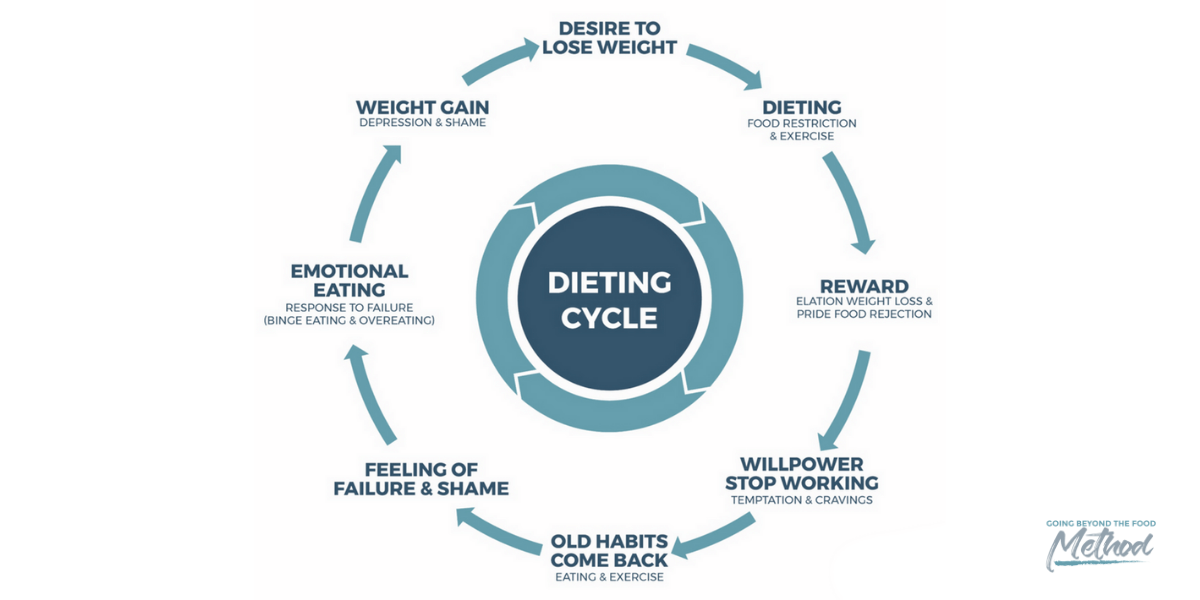

On the other hand, trying to uncover the root causes can be tedious, complicated, and at times, scary. Sometimes, to the extent where people run away when they realize the root cause problems that are underneath. Subsequently, addressing these root causes often requires a change of thinking and some pain and effort, but the results will be much permanent and higher-value than correcting side effects (symptoms as known in health).
As we touched in our S1 EP3 podcast episode Diet mindset professional training, we unpack how our certain traits of character are the results of dieting.
Here are just some of the real root causes:
- Perfectionism (Effect): Need to have “perfect” diet (Effect): Diet Cycle (Effect): Desire to lose weight (Effect): Body Dissatisfaction (Effect): beliefs about what body should look like (Cause): fatphobia/weight stigma (Cause)
- Low self-confidence (Effect): Need to lose weight (Effect): Perfectionist Body Fantasy(Effect): beliefs about what body should look like (Effect): fatphobia/weight stigma (Cause)
- Binge eating (Effect): food restriction (Effect): Dieting to lose weight (Effect) : fatphobia/weight stigma (Cause)
The root cause wasn’t in the what, when, and how they ate. It was in the why. In my first few years of practice, I stopped asking why too early in my investigation process. Even when I asked “Why do you eat like this?” “Why do you want to lose weight?”…I was blinded by my own fatphobia.
Fatphobia
Fatphobia is the fear and dislike of obese “fat” people and/or “obesity”. I was fatphobic and was profoundly afraid of gaining weight. In fact, I was professionally trained to believe that “fat” was the root cause of most chronic conditions. I was taught that everyone should be or want to be at a “normal BMI”.
Hence, I had to confront my own and discover the truth about body weight, BMI & health to be able to ask the right question with my patient and for my own recovery from diet culture.
Not only was my own fatphobia preventing from being the best health professional I knew I could be, but it also was keeping from accessing my best health. Fatphobia in research is also described as weight stigma. Research recognizes two forms of weight stigma:
Experienced weight stigma
This occurs when people observe or believe that others have made unfair negative assumptions about them or discriminate based on nothing more than their weight or body image.
Internalized weight stigma
This is the process by which people accept weight-based stereotypes and make them true about themselves. People who have internalized weight stigma are the harshest critic of themselves. They have come to believe that they are “less-than” because of their weight/ body image.
Research is pointing out that internalized weight stigma has the greatest impact on physical and mental health over experienced weight stigma.
“Some people fear that if people feel too good about their bodies and themselves, they will not be motivated to engage in healthful eating behaviors and physical activity. Studies show the exact opposite to be true: When people internalize weight stigma and feel bad about themselves because of their weight, they feel less confident in their ability to engage in healthful behaviors and are more prone to binge eating, avoiding physical activity, and other behaviors that contribute to weight gain.”
– Rebecca Pearl, PhD, an assistant professor of psychology at Perelman School of Medicine at the University of Pennsylvania in Philadelphia.
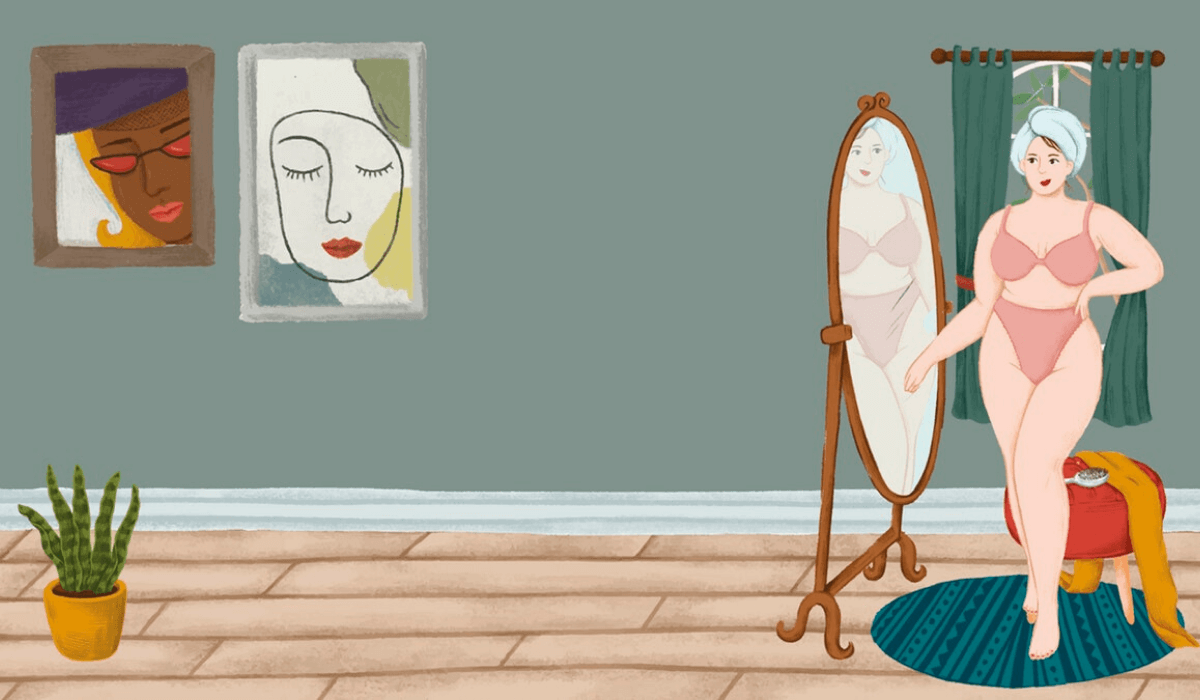

Weight stigma is the REAL root cause
Weight stigma is the negative attitudes and beliefs about people because of their weight. It leads to the labeling of people with stereotypes based on their weight. Unfortunately, it’s a common belief that weight stigma will motivate people who don’t meet body size ideals to change their behaviors, in order to avoid further stigma.
Weight stigma originated from the “old school” model of behavior changes through punishment or shaming. A great example of this today is the “before and after” picture we see so frequently on social media. They are unfortunately used by many health professionals.
Weight stigma is a centric element of diet culture. In fact, research has demonstrated that diet culture helps frame a larger body as a “health hazard”. I like to explain it to my students as the “goon” of diet culture. Without it, diet culture may stop existing.
Weight stigma has been researched extensively over the last 20 years. What research overwhelmingly shows is that weight stigma doesn’t encourage people to lose weight or improve their health. Instead, stigma leads to a greater risk of depression, poor body image, and self-esteem. It also leads to increased stress, disordered eating behaviors, and avoidance of physical activity.
Weight stigma has also been linked to many common health problems that were first associated with “obesity”. Is “obesity” or the stigma associated with “obesity” the true culprit? As you can imagine, experts and researchers are divided on this question. Since we acknowledge that weight stigma is causing the health issue, then diet culture will need to be condoned publicly… can you see the issue?
You can read more Cyclic Obesity Weight Based Stigma Model.
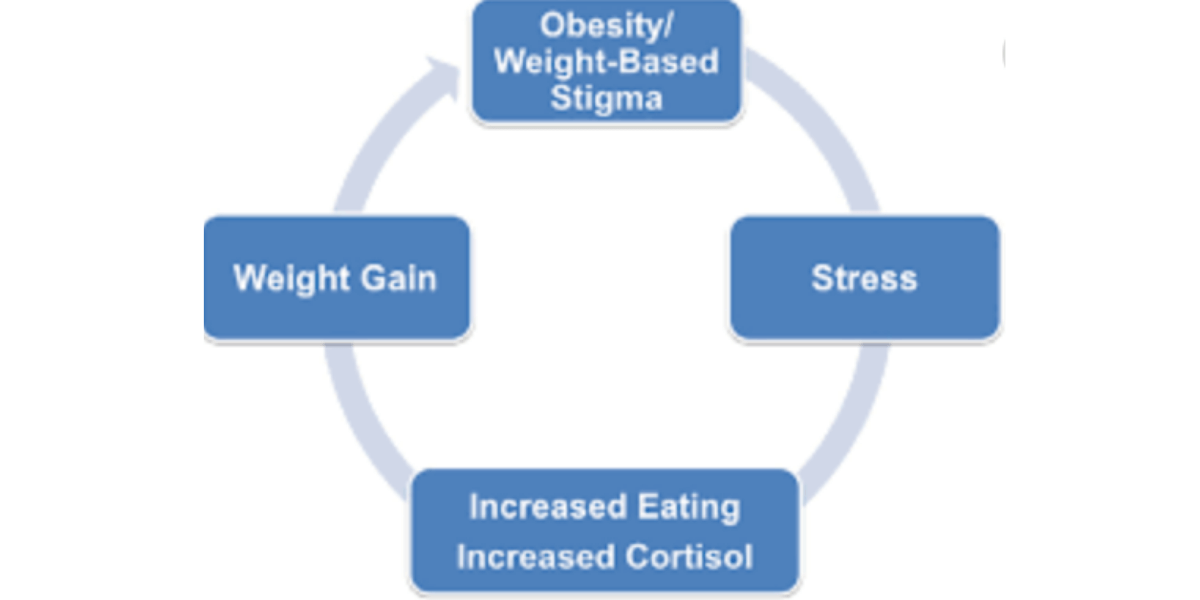

The Solution: Body Image healing
The only way to address the real root cause is to include body image healing in your practice/ program.
Making peace with my own body and healing my own body image was the path to releasing my own fatphobia. Doing so unlock my ability to end weight stigmatization in my own practice.
What most health professional doesn’t realize is that our individual body image is not only how we see ourselves when we look in the mirror. It’s also multidimensional. It encompasses:
- Perceptual body image: how you see your body
- Affective body image: how you feel about your body
- Cognitive body image: how you think about your body
- Behavioral body image: the way we behave as a result of our perceptual, affective, and cognitive body image.
Research is showing that a distorted body image leads to lower self-esteem, distorted relationship to food, depression, anxiety, hormonal disruption, and many other side effects. Many of our clients and patients come to see us for this in the first place.
Thomas F. Cash, PhD, is a true pioneer in the psychology of physical appearance research. He also developed today’s most effective treatment approach to body image issues, as well as many of the measures used in body-image research. Likewise, the body image healing cognitive-behavioral model is at the center of our proprietary non-diet approach, The Going Beyond The Food Method™️ .
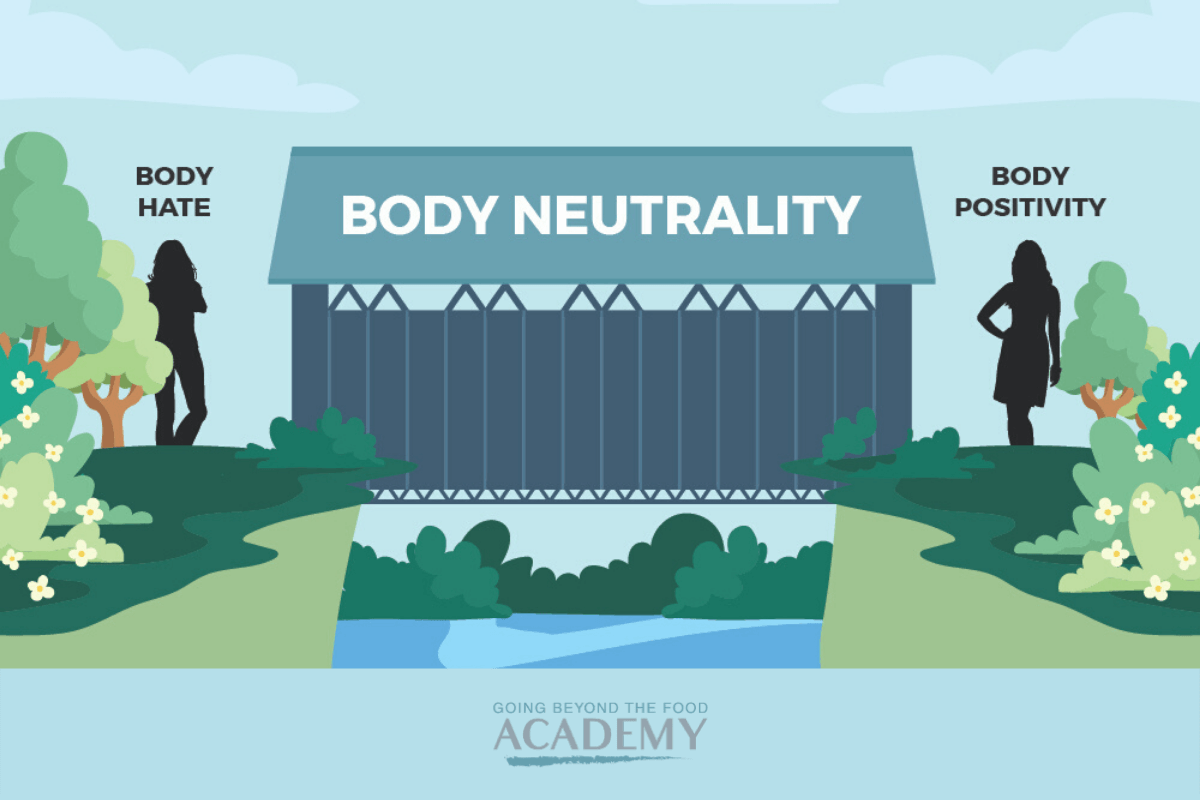

Body Neutrality
In our non-diet clinical approach, we teach our clients the body neutrality framework and not body positivity. It includes body image professional training, the body neutrality framework.
Body Neutrality empowers women to embrace themselves as they are, including the parts they don’t like about themselves. Its focus is to avoid self-hate while simultaneously relieving from the pressure of having to love their body. Most importantly, the goal is to respect and accept your body for what it is – and that’s it.
Body Neutrality is the middle ground between positivity and negativity (shaming). Embracing body neutrality over body positivity allows our clients to experience negative feelings about their bodies, but without the pressure that comes with having to be positive all the time.
Body Neutrality helps women detach their self-worth from their bodies (good or bad). It’s about crafting a relationship of functionality with our bodies and engaging with it from a place of self-care instead of control.
Health can be weight-neutral
The World Health Organization defines health as “a complete state of physical, emotional, and social well-being, not merely the absence of disease or infirmity.” A weight-neutral approach to health is based on the idea that your health status or risk level can’t be determined solely by your weight.
It acknowledges that your weight is determined by a complex set of genetic, metabolic, physiological, cultural, social, and behavioral determinants. Many of these factors are either difficult or impossible to change.
Instead of focusing on a weight-oriented outcome, weight-neutral programs teach you to take charge of the factors within your control. These factors include your thoughts and behaviors. In short, taking charge of these factors will help you improve your well-being, regardless of your weight.
Weight-neutral approaches to health like the non-diet approach have significantly decreased body dissatisfaction, disordered eating, and depression. They’ve also increased sustainable, enjoyable self-care behaviors such as eating and moving well in the long term.
A 2013 study by the Journal of Obesity found no link between body weight and the way we feel about ourselves. Yet, the findings show a link between how we feel about ourselves and the healthy activities we engage in. Meaning, the better we feel about our bodies the more likely we are to take care of them by eating well and being active, allowing us to create a positive cycle. Likewise, dissatisfaction with our bodies can discourage us from taking part in certain activities, eating properly to fuel our bodies and can eventually lead to weight gain.
The non-diet approach
The non-diet approach to health and nutrition recognizes that weight stigma is a contributor to one’s health. As professionals, we must address how our clients and patients relate to their body as the root cause before we can effectively address the effects ( eating and health habits).
The non-diet approach to health is the exact opposite of dieting. It’s a weight-neutral approach to health that instead focuses on a weight-oriented outcome. This approach focused on all the other factors that can impact one’s health beyond body weight. In other words, the ultimate goal is to support the patients to become their own experts at their bodies.
The Going Beyond The Food Method™️ is our proprietary methodology that helps women to recover from diet culture and learn the non-diet way of life. Firstly, our 4 pillars are Body Wisdom, Body Trust, Body Respect, and Body Neutrality. Secondly, our framework is composed of 5 steps process: Intuitive eating, Body Neutrality, Self-Coaching, Emotional Intelligence, and Mindfulness.
The non-diet approach professional training center
We have created a number of free non-diet approach training resources to help you begin learning more about this revolutionary health approach. Join my non-diet professional community by requesting our non-diet client assessment tools
You can also listen to our non-diet podcast.
You can access non-diet approach training here
The non-diet coaching certification program
The Going Beyond The Food non-diet coaching certification program is a space where you can receive support guidance to become the best non-diet professional. It’s a program geared to refine your non-diet professional skills set and teach you the skills you need to build a successful business that can impact thousands of women.
It will help you develop as a powerful leader and help other women come back to their power. You will learn how to harness your ability to support and help other women. As a result, you can impact thousands of other women and dismantle diet culture.
Ready to get started with the Non-Diet Approach?
You can access all of our services on our work with us page. We have a number of programs and service levels enabling us to serve most women:
Free Resources and Masterclasses: Get started and get to know us better!
Private coaching with Stephanie and her team Stephanie and her team of Certified Non-Diet Coaches are waiting to support you in a one-to-one setting with an individualized plan.
Non-Diet Coaching Certification for professionals ready to integrate the Going Beyond The Food Method™️ in their practice and for women wanting to become Certified Coach and build a business coaching other women beyond the food.
Diet Mindset: How to unlearn diet culture thoughts
Diet mindset professional support to unlearn the diet culture thoughts training was not available when I started my transition to a non-diet approach to nutrition and health as a clinical nutritionist; had to figure it out on my own. Piece it all together…
In this podcast episode First Do No Harm: The Intuitive Eating Mentorship Journey I argued that the current model of practice for a nutrition professional top-down approach is causing more harm to a particular segment of our clients: women on the diet roller coster.
The solution: The bottom-up approach. Start first with addressing the diet mindset so we can move to coach nutrition and health later in the journey. Enter diet mindset professional training!
In this article, we will cover:
Diet Mindset Professional Training
Self-Coaching for Intuitive eating
If you would like to listen to the article in audio format the Going Beyond The Food Show – Pro Series Season 1 Episode 3
Links mentioned in the episode…
Non-Diet Coaching Certification
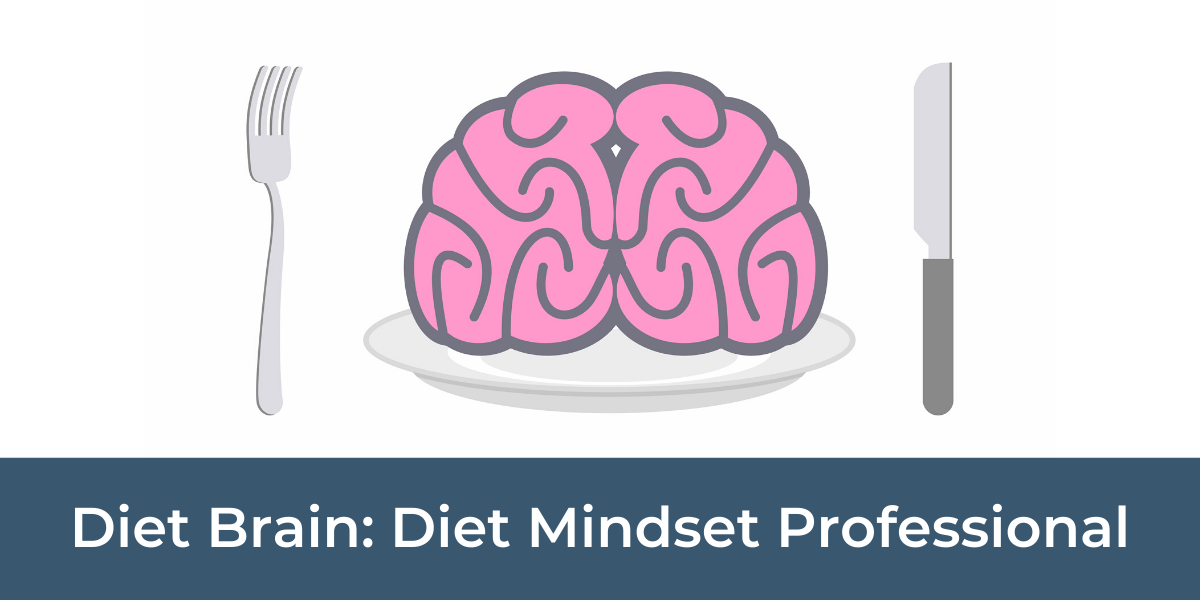

Diet Mindset Professional Training
In my professional studies as a clinical nutritionist, we barely touched upon the psychology of eating or diet mindset professional training. We jumped right into the WHAT to eat emphasizing greatly why it was so important to our health with a lot of facts and data.
So, I went into private practice and model what I had learned. Spending hours creating a complex protocol. Very quickly, I realized that wasn’t going to work… clients were overwhelmed and scared of the complexity of what they would have to do. I went to what I was taught: trying to convince them with studies, facts, and data as to why restricting this and that food was essential to their health. That didn’t work either.
Why wasn’t it working? Back then, I had no answer but today after years of independent studies I can tell you why: intellectual knowledge is not what motivates humans to change or make different choices. Especially not with food. The answer diet mindset professional training.
How human make food choices
So, if data points and fear-mongering isn’t an effective tool to help people change their eating habits, what is?
Of course, the primary driver to food choices is hunger however, what we choose to eat is not only our physiological and nutritional needs. Many other factors influence our food choice according to research:
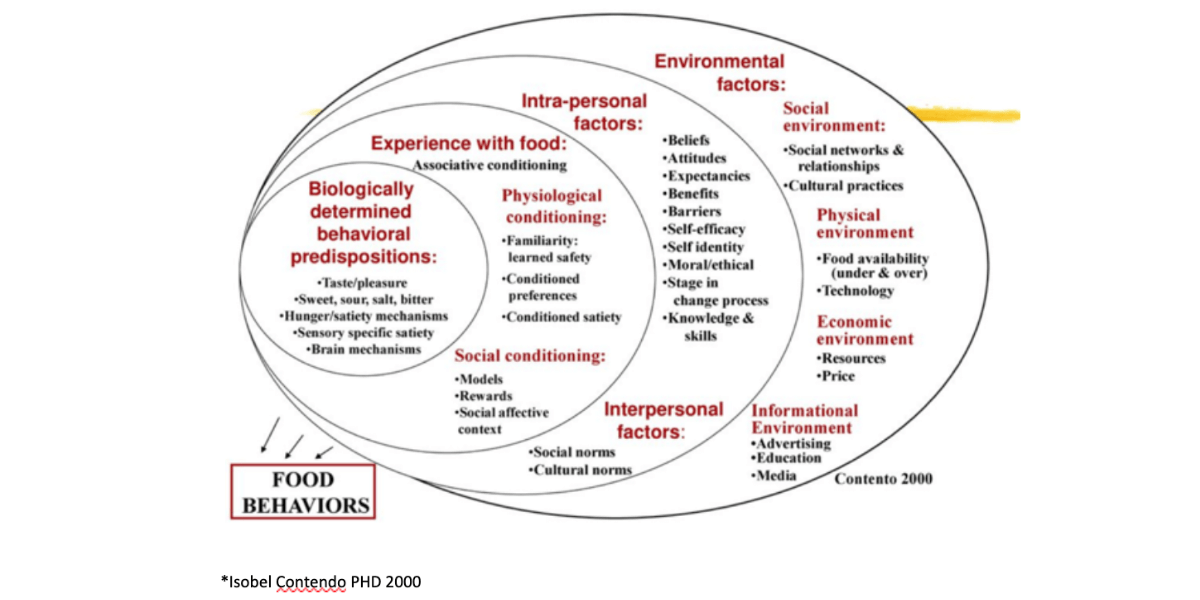

Biological Determinants
For example, our innate eating cues hunger, fullness, and satisfaction which is what is recognized as eating cues in the world of intuitive eating coaching. You can also include here Set Point theory which I discussed in depth with Chris Sandle on our Going Beyond The Food Show podcast series about weight loss.
Economic Determinants
In sum, here we can think of cost, income, availability of food which is truly out of our control as health practitioners. These are major issues with the newest version of diet culture: the Wellness Diet.
Physical Determinants
For example, access, education, skills (e.g. cooking skills), and time availability which are mostly out of our control as health practitioners.
Social Determinants
This aspect of our food choices such as culture, family, peers, and meal patterns are mostly out of reach for us as health practitioners except one that is particularly relevant to our segment of women who have been chronic dieters: weight discrimination.
There is emerging evidence that experiences with weight stigma may lead to different eating behavior. For example, individuals ate more food after exposure to a weight stigmatizing condition. Additionally, in a study, 79 percent of women reported coping with weight stigma on multiple occasions by eating more food.
A properly structured non-diet approach to health engages clients and patients in learning coping skills to help reduce the impact of weight stigma.
Psychological Determinants
This is the world of mind and emotions. Elements such as mood, stress, and guilt are one area that as non-diet health professionals should be included in our approach.
Today, it is widely recognized that food influences our mood, and that mood has a strong influence on our choice of food. For this reason, these determinants are the first 3 pillars of the Going Beyond The Food Method™️ .
Attitudes, beliefs, and knowledge about food
This is where we include intellectual knowledge about food but also include all the constructed food beliefs pass down to us from the weight loss & wellness industries in order to sell their products.
How the diet mindset develops
What’s unique about our eating behaviors, unlike many other biological functions, is too often subject to sophisticated cognitive control.
We consciously manipulate our food choices beyond the need of our bodies to achieve other external gains/ goals in our life. One of the most widely practiced forms of cognitive control over food intake is dieting (cognitive dietary restraint).
In most studies on the topic of food choices, it’s most often observed that women and men behave differently with food. In this study, women reported significantly higher restraint, more guilt after eating in various types of social situations, and more overeating in reaction to unpleasant emotional state mood.
Women’s bodies are imposed on different beauty standards than men’s bodies. Diet Culture reinforces the thin ideals to women leading 91% of women in western societies to dislike their bodies and using dieting (cognitive food restraint) to meet diet culture expectations of their body size and beauty.
With repeated failed attempts at dieting, dieting has a 91%-95% failure rate over 5 years period, women’s brain & body develops coping mechanism as a mean of surviving diet failure and weight stigma. This is why we need diet mindset professional training!
Common thought errors or cognitive distortion
When it comes to how we think, the dieter’s brain adapts using what we know as cognitive distortion or thought errors.
Let’s take a step back first to make sure we all understand how the human brain functions.
When faced with an event or a trigger, labelled in the model below as circumstances then given an interpretation. This interpretation is based on our long-held beliefs, past experiences, values system including diet culture. We then form an opinion, a thought which then ignites an emotion. The emotions we feel then creates the actions or behaviours we take. The collective action we take then creates our result.
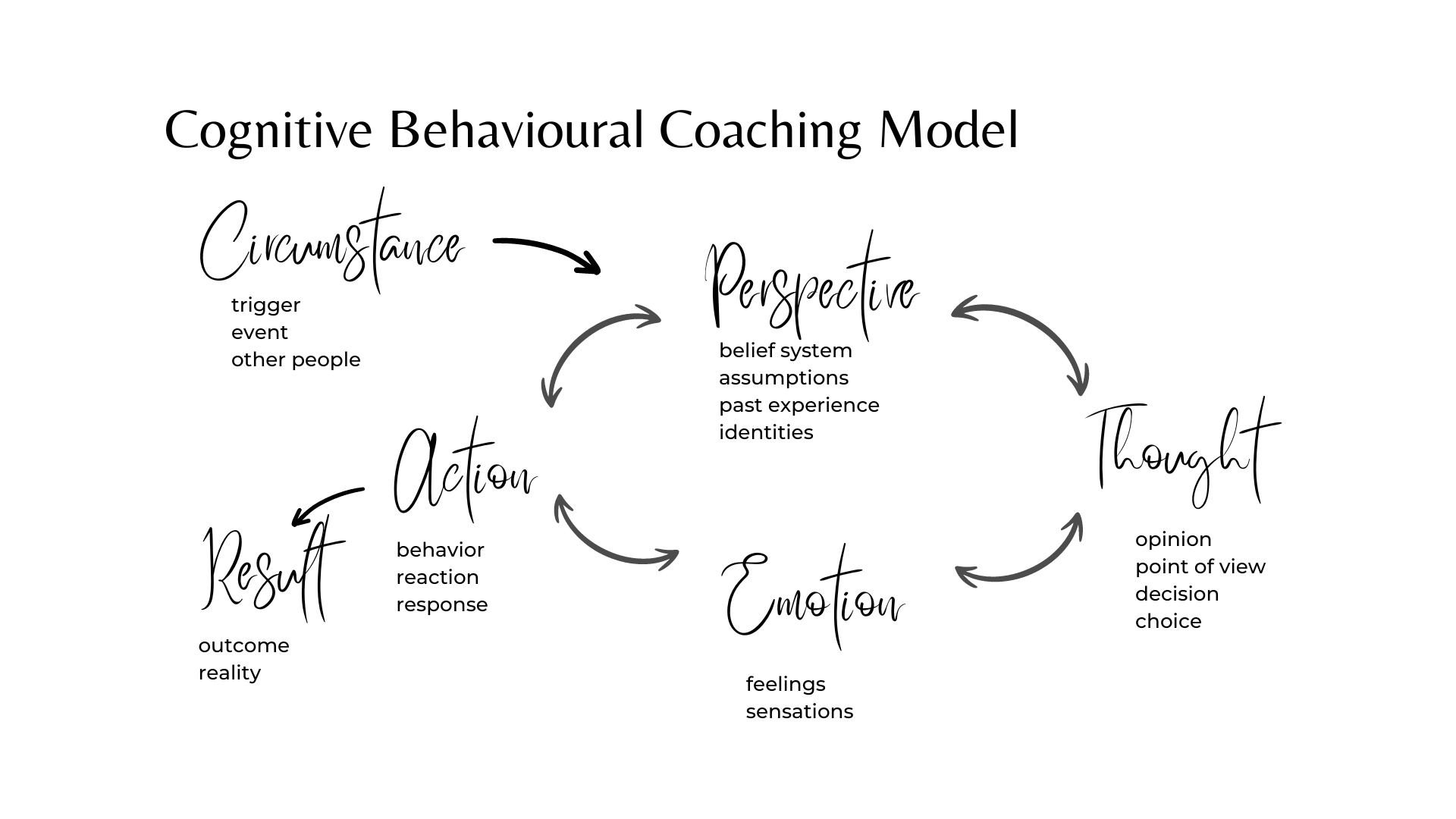

Cognitive Behavioral Coaching Model
Over time, the brain, or mind, adopts a “way of thinking” as a means to survive what we perceive as a difficult situation. These flaws in thinking are known as cognitive distortions or thought errors. This is what keeps women in the cycle of dieting and body shaming even though it has proven to be a very ineffective way of living life.
- Mental filtering
- Jumping to conclusions
- Personalization
- Black and white thinking
- Catastrophizing
- Overgeneralization
- Labelling
- Emotional reasoning
- Magnifying/ Minimizing
Over the years of working with women in a non-diet model of care approach, and my personal journey in recovering from 25 years dieting career, I have observed a pattern in cognitive distortion. I coined the term Diet Brain to better express this pattern.
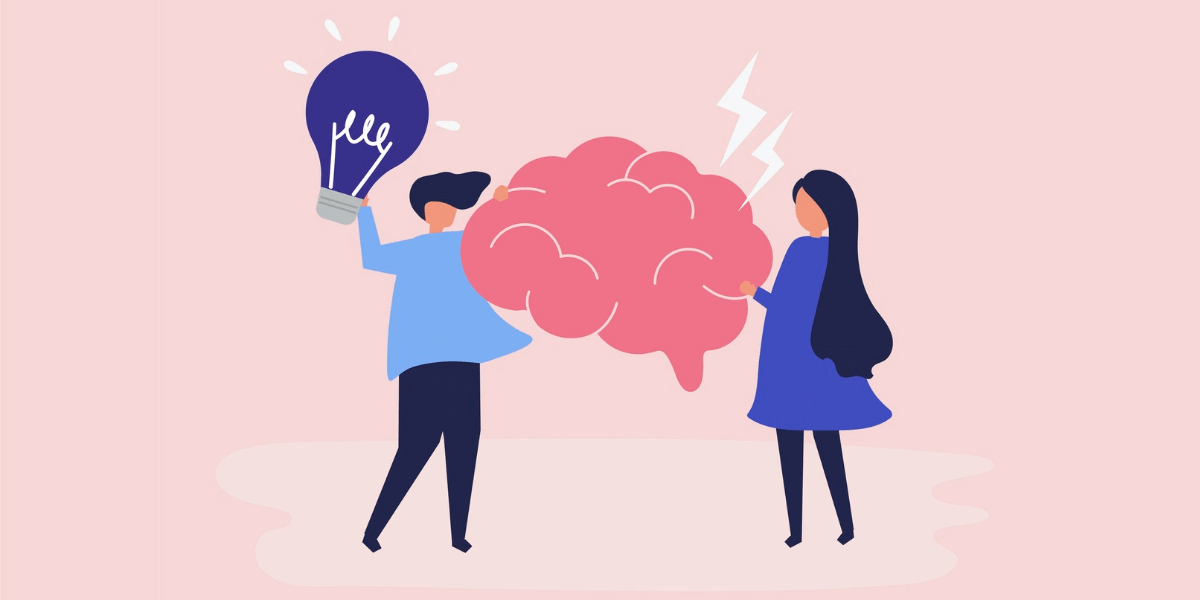

Diet Mindset & Diet Brain
Diet brain, the term I coined a few years back, is the collective of 4-main thought errors. In my clinical observation and personal experience overcoming each one, this pattern that is present in most women chronic dieters I have worked. What are these traits?
All or nothing / Black and White thinking
This can be best described as the on the diet / off the diet lifestyle. The good and bad food dichotomy as dictated by diet culture. With time, it spread these faulty thought patterns to every aspect of our life: exercise, work, career, relationship, how we raised children….
Perfectionism
Simply put: Everything must be perfect to off so we can be worthy of love, acceptance. At first with diet, food, and exercise but as failure cumulated, it becomes a way of life to prevent potential rejection due to “unperfected body”.
This cognitive distortion leads to a perfectionist fantasy. We make our current life so miserable by thinking that solving your problem (aka body size and appearance) will provide us with the happiness we are seeking that we actually never live (and enjoy) our current life.
Mental filtering: It’s my body’s fault
The body and its size take the blame for everything that’s wrong in your life. From health to a relationship, to opportunity, to emotional state… it’s all the body’s fault. Women then consistently compare themselves with others based on beauty and body size.
People-pleasing
This is when women move to external validation because internal validation is absent. As they believe that they are unacceptable, they will attempt to please and comfort everyone around them as a means of avoiding rejection and gaining acceptance.
These four most common cognitive distortions most present with women chronic dieters then strongly influence their eating patterns, ability to practice self-care, and create health-promoting habits.
The non-diet approach will first help the client and the patient with their mindset and emotions before engaging in nutrition education. In our diet mindset professional training, we teach the framework of self-coaching.
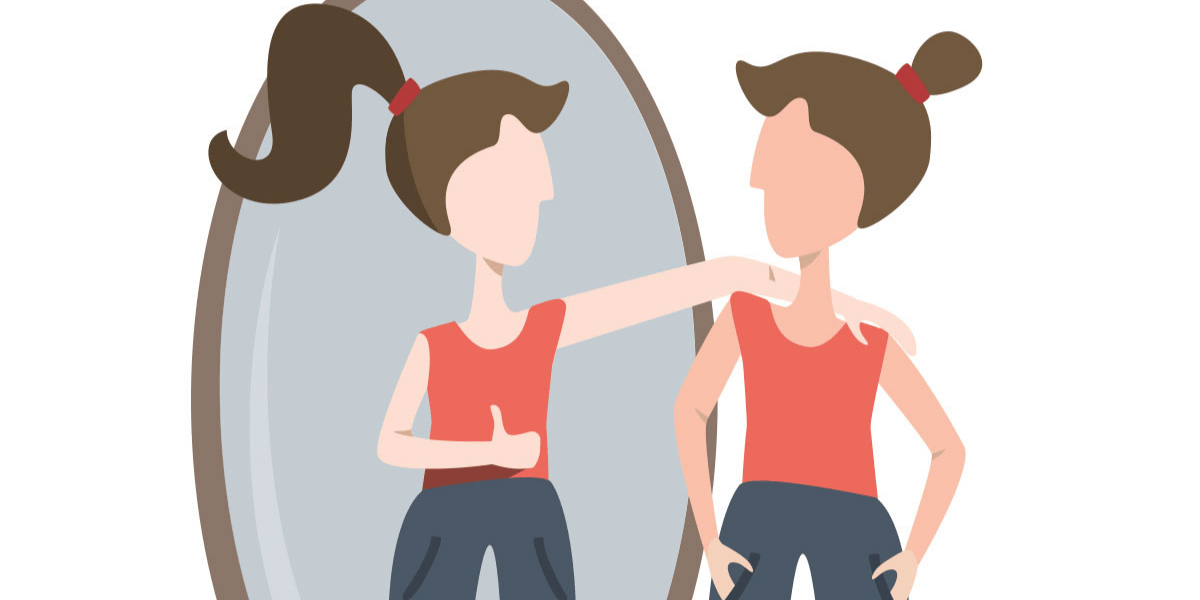

Self-Coaching for Intuitive Eating
Self-Coaching is a framework that supports first becoming aware of our thought, observing them without judgment and last to change our thinking. It’s also an effective approach supported by neuroplasticity. Neuroplasticity is the brain’s ability to reorganize itself by forming new neural connections throughout life.
We’ve developed a unique framework that supports the long-term goal of helping women recover from diet culture and become intuitive eater and body neutral. This is the best tool for diet mindset recovery for a professional approach. Self-coaching for intuitive eating is applied in 3 steps:
Step 1: Self-observation
The process of self-coaching cultivates the first skill which is about being an observer of our inner world – our thoughts and our emotions. This process helps raise the level of interception that clients will need as they begin to explore their innate eating cues with intuitive eating.
Step 2: Non-judgement
Self-coaching is about exploring your inner world with a “lense of curiosity” instead of judgment. Asking the question “I wonder why I think like this or do this” instead “I’m so stupid because I do this” is empowering and creates deep mental clarity. You can then decide how you want to think about X or what you want to do about Y.
Step 3: Conscious response
The last step of self-coaching is about choosing conscious responses or thoughts that work best for you and your specific situation, problem, or challenge. Self-coaching is ultimately about deciding consciously instead of reacting unconsciously.
Self-coaching as a thought in an intuitive eating mentorship program is about teaching our clients to connect to their innate wisdom and their power. It leads to emotional intelligence by taking charge of your mind and emotions.
That’s the feminist approach to food and health.
Get Started with Diet Mindset Unlearning Professional Training
We have created for you a number of free non-diet professional training resources to help you begin your research in the field of non-diet approach to health. You will find non-diet online training, webinars, podcasts, and articles.
You can access the non-diet coaching professional training here:
Non-Diet Professional Mentorship
Our Non-Diet Coaching Certification is a high-level business mentorship program for health professionals who want to take their business to a non-diet model of care. This program includes diet mindset professional training.
A 6-month journey of business and personal growth exclusively designed for female health entrepreneurs mastering their own journey beyond the food with intuitive eating and body neutrality, while also learning to market their intuitive eating business with a heart so they can have a massive impact on women’s health.
Intuitive Eating Business
The thought of starting an intuitive eating business can be scary and overwhelming.
Even for those that currently have a health business and want to transition to a non-diet business is frightening. Will I be able to sustain my income?
How can I make money off if I’m not selling meal plans, diet programs, detoxes, and cleanse?
If I’m not creating complex protocols for my clients: why would they pay me?
These are the type of questions this article aims to answer and many others.
What is the business of intuitive eating?
Being an Intuitive Eating Coach
Intuitive Eating Coaching Outcome
Who do we serve in an intuitive eating business
First Step to start an intuitive eating business
What is a Non-Diet Mentorship program?
If you would like to listen to the article in audio format the Going Beyond The Food Show – Pro Series Season 1 Episode 2
Links mentioned on the episode
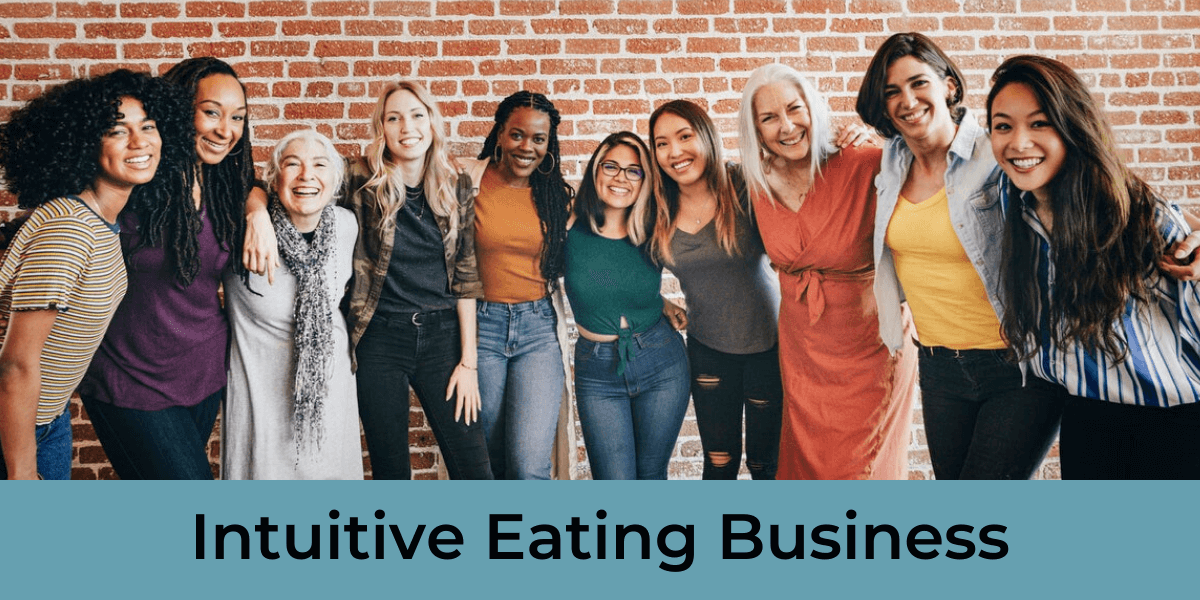

What’s an intuitive eating business?
An intuitive eating business is when you exchange money in order to support someone with intuitive eating. This support can come in many different ways:
- Teaching them an intuitive eating framework
- Coaching their learning or progress as an intuitive eater
- Supporting them in their intuitive eating journey
- Encouraging to move forward when they struggle
- Answering their questions
- Inspiring them to move forward in the face of adversity
- Creating products that will support people who want to become an intuitive eater
This business is not a formulated typical health business and does not hold the same value system considering that most health businesses are created to support diet culture ideology.
The most prevalent difference in a diet culture-free business resides in its approach to healing. An intuitive eating business is anchored in what I describe as a “bottom-up” approach versus a “top-down” approach. The goal is to empower you to become your own expert at your body. A typical health business that is rooted in diet culture is built around the provider being the expert and telling you how to engage with your body. Very disempowering.
An intuitive eating business is based on self-compassion, trust, respect of the individual innate body wisdom, and ability to heal themselves.
As of today, the most frequent intuitive eating business model is the coaching business model. You exchange money with your service as a coach.
Intuitive Eating Coach Business
As an intuitive eating coach, you are healing your client/ or patient… they heal themselves. Your clients/patients have all they need to heal their own relationship with food and body. For many, that’s a departure from their professional training… it’s ok to feel unsafe at first.
An intuitive eating coach is a health professional who guides clients/patients in their recovery from Diet Culture. Moreover, your job is to guide clients on the path of becoming an intuitive eater by listening to their concerns and helping them with problem-solving. Recognizing what we spoke about in the first episode of season 1 of Undiet Your Coaching Podcast, that the human relationship to food is by far more complex than just simple food choices.
Problem-solving with your client as an intuitive eating coach will not require you to provide a complex meal plan or macro ratio. Instead, helping them master their mindset particularly shifting away from diet mindset towards a compassionate mindset.
You will help your client move from an external cue to know what to eat, when to eat, and how to eat towards internal cues. As well as helping them feel their hunger, fullness and find satisfaction in what they eat. Instead of teaching your clients to suppress their cravings and how to “fill up on aid food”, you actually help them be in their body at the moment.
You help them understand that all food is good. That being healthy doesn’t mean being restrictive and feeling deprived. That they no longer need to earn their food. You empower your clients, give themselves permission to eat.
Intuitive Eating Coaching Outcome
Your goal is to coach your clients in building confidence in their own eating cues to be their own internal nutritionist. Instead of helping your client live a “normal life” in a very restrictive dietary protocol and how to make cauliflower brownie, you help your client give themselves permission to eat.
With compassion, you guide your client to cope with emotions differently. Helping them build resilience and emotional intelligence. Helping them learn to process their emotions without food.
As your clients build trust and respect with their innate body wisdom, you help them detach from being their bodies and their appearance. In addition, helping them reconnect to their innate worth as women. Guiding your client away from shame towards neutrality. Helping them embrace self-care beyond their physical bodies.
Finally, you help educate your client to a weight-neutral health approach guided by health at every size principle. Moving their body with joy and practicing gentle nutrition.
Being an effective intuitive eating coach requires you to be an intuitive eater first with a willingness to grow and learn from your clients. You must possess intuitive eating professional skills but also, mindset coaching skills, behaviour modification skills. Also, mindfulness and body image resilience skills.
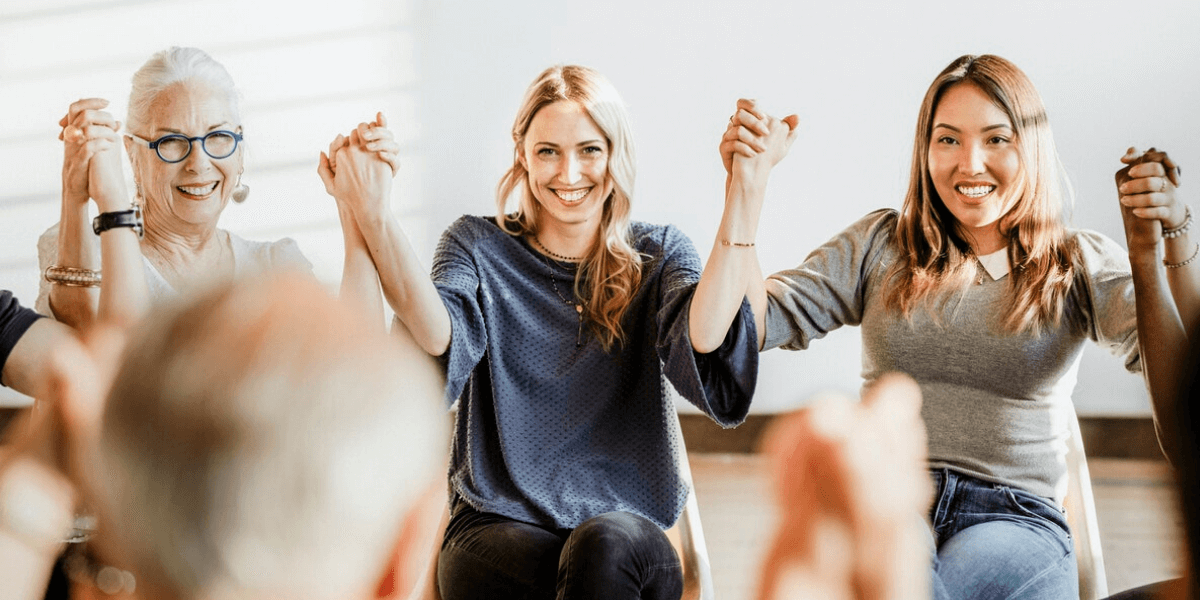

Serving versus Selling
Let’s talk about what everyone thinks about but doesn’t want to talk about. It’s going to get uncomfortable for some…
It’s ok to be making money coaching intuitive eating, to exchange your coaching services for money. There’s nothing wrong with wanting to be successful in your intuitive eating business. It’s ok to monetize your professional skills.
Ready for this one: The more revenue you create, the more money you make in your intuitive eating business means more people freed from diet culture. Yup, it truly is.
Now, how you monetize your services and create business revenue does matter. You can build a business in a masculine, patriarchal way or you can choose to embrace your female energy that empowers everyone even those who do not purchase from you.
You can serve instead of selling. Serving means engaging with our clients without expectation. You offer value by creating free content, teaching your audience the very basics of intuitive eating, providing free resources to everyone. You become a resource helping people break down their own barriers, fears, and supporting them with an empowering message. Guiding them to the next level resources available.
The opposite of serving is the hard sell, aggressive to close mentality that comes across as pushy and self- focused. When you are focus on selling, you create free resources guard to disempower people so they are led to believe that the only way for them or resolve their problem is by buying your product.
Serving is based on love. Selling is based on fear. Serving leads to selling without selling.
Who do we serve in an intuitive eating business
We must recognize that the intuitive eating model of nutrition is not accepted by the traditional model of healthcare. As a result, intuitive eating services are mostly never covered by traditional insurance providers. Our services are typically private care, meaning an out of the pocket expense.
This is why most intuitive eating professionals have to be entrepreneurs alongside their profession. You can provide service for someone else’s business but in most cases, you will need to be running your own business.
This means that you need to embrace entrepreneurship and learn about setting up and maintaining a business, marketing your intuitive eating business as well as getting and retaining clients.
Let’s make something clear here: a professional health certification isn’t how you will learn to run a business. The vast majority of health certifications do not include business training and if they do, it’s not focused on a non-diet business model but instead a model that supports diet culture.
That’s why I created the Non-Diet Coaching Certification program. If we want to be successful in dismantling diet culture, I need you to know how to successfully operate a business.


First Step to start an intuitive eating business
The first place to start is with a business strategy. That’s you creating a brand-new business of transitioning your current business to an intuitive eating business model, you need a business strategy.
The strategy is what will turn your passion into biz and blow you to impact thousands of women. It’s the roadmap you will look up to as you work day-to-day in your business. Your business strategy consists of the following:
- Why
- What
- Who
- Where
- When and the…
- How much
The first layer of your business strategy that we teach is the why… not the what. This is where most business strategies go wrong. The business you create needs to be in alignment with your personal values, your personal goals, and how YOU want to lead your personal life.
To be an effective heart-centred intuitive eating business owner, you must care for yourself first. Make sure your business supports YOU not the opposite.
Non-Diet Business Coaching
Today, I own and operate a very successful intuitive eating business. It’s not always been like this. In this first episode of the PRO Series podcast, I share the story of my own professional and business evolution.
It took time and resources for me to get where I’m today. For over 4 years, I searched and trained in various professional training programs to create the Going Beyond The Food Method. I shared more on this in this podcast episode.
Although I had 15 years of retail business operation experience, I also had to learn the health business model. I had to educate myself, get coached in my blind spot, be mentored. Over the last 10 years, I invested approximately $60,000 in my business.
- I hired an experienced nutrition business coach before even graduating -8K
- The year following my graduation, I committed my first health business mastermind -10K
- 4 years ago, I hired an online business coach to help me transition my business online – 10K
- Over the next years, I have purchased 26k in online business skills courses to learn email marketing, funnel, summit, branding, etc…
Non-Diet Coaching Certification Program
The Going Beyond The Food non-diet coaching certification program is a space where you can receive support guidance to become the best intuitive eating professional. It’s a program geared to refine your professional skills set and teach you the skills you need to build a successful business that can impact thousands of women.
It helps you develop as a powerful leader and help other women come back to their power. You learn how to harness your ability to support and help other women. As a result, you can impact thousands of other women and dismantle diet culture.
I believe that the only way for us to be able to end diet culture oppression of women is by us women coming together and helping each other as women back into our power via intuitive eating and body neutrality. This is a woman issue…that must be resolved by women.
As women, we need to step up and change the future for the young generation of girls. We need to teach them that they aren’t defined by their bodies, we need to crush DC so it never gets its dirty hands on the upcoming generation.
The liberation of the upcoming generation will only come through our generation’s liberation from diet culture and patriarchy.
Currently, the traditional model of nutrition, coaching, and even health care is not set-up for this…it’s entrenched in diet culture. Most of the wellness industry is deeply entrenched in diet culture. The alternative health industry claims to be about the root cause… but never looked at the reason why women engage with food and body.
Bottom line we need a new approach
We need women who can help other women change their relationship to food and body, empowering women to become their own experts at their bodies, to help women build confidence in themselves and their power to know what’s right for them.
Women who will support other women. We need emphatic, compassionate women who have the skills to connect with other women and a passion for change.
My job is to ensure these women are doing their job so well while creating a sustainable business so they can keep impacting more women for years to come. Furthermore, my job is to ensure that these women are successful so they crush diet culture for the generations to come.
Ready to get started building an Intuitive Eating Business?
You can access all of our services on our work with us page. We have a number of programs and service levels enabling us to serve :
Non-Diet Coaching Certification for professionals ready to integrate the Going Beyond The Food Method™️ in their practice and for women wanting to become Certified Coach and build a business coaching other women beyond the food.
Good Money Business Mastermind A business mentorship and a collective of ambitious, driven and empowered anti-diet culture providers and coaches on a mission to dismantle diet culture and make GOOD money doing it!
Free Resources and Masterclasses: Get started and get to know us better!
Intuitive Eating Mentorship For Professional: First Do No Harm
I help women with intuitive eating mentorship programs today but it wasn’t always so…
8 years ago, I was 2 years into my nutrition practice, Carolyn walked into my office. And she had just been diagnosed with high blood pressure and high cholesterol. She desired to be “healthier”.
I proceeded to take a diligent intake. And this intake process included a food journal, detailed health history as well as a symptomology assessment. Based on my assessment I concluded that a “whole food diet” would support her goals. Along with other lifestyle modifications.
Not only how I was teaching nutrition different but also my approach. So Carolyn would add foods to her plate instead of removing foods. Carolyn left my clinic with her food list, food journal and “ideal plate” handout in hands.
Then two weeks later she was back for a follow-up. Within 10 minutes, she was in tears.
“I’m so sorry Stephanie I wasn’t able to follow what you told me to do and thought this time would be different. My urges to binge on processed food at night are back in full force. “
“I ate my kids’ food in secret. What is wrong is wrong with me??”
Are we causing harm to our clients?
Shifting to a non-diet approach to health
The Going Beyond The Food Method™️
Non-Diet Professional Training
If you would like to listen to the article in audio format the Going Beyond The Food Show – Pro Series Season 1 Episode 1
Links mentioned on the episode
PRO Series – Free Training & resources
Non-Diet Coaching Certification
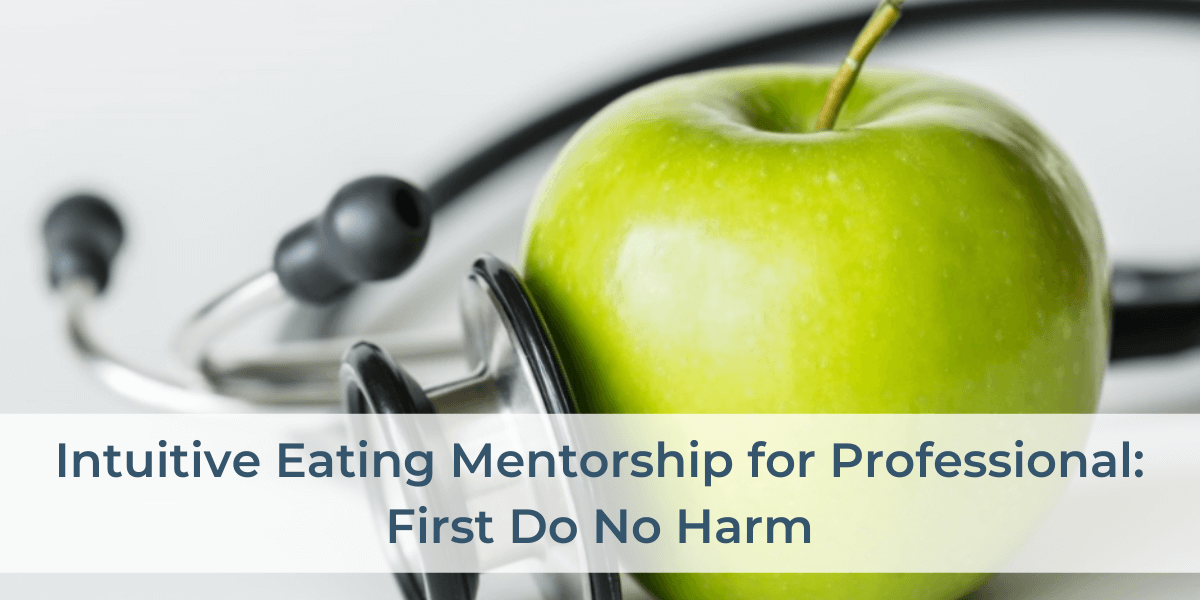

Are we causing harm to our clients?
We do not know what we do not know.
I was aggravating an underlying condition for Caroline. Not only did Carolyn had a disordered relationship with food but also with her body image due to years of chronic dieting. And all of my assessment tools and training never accounted for this condition. I was neither taught to assess how patient-related to food or to consider past dieting behavior in my assessment.
Fast forward 8 years later. When I reflected back on my first few years of practice not only most of my female clients were in fact in a disordered relationship with food but I also was.
Most nutrition experts engage in disordered eating
In 2012, an international study in 14 countries found a whopping 77 percent of nutrition students felt that eating disorders were a concern among their peers. And the reasons behind this are complicated: theories run from an obsessive overexposure to information about food and exercise, to pressure within degrees to be an “ideal nutritionist.”
Individuals that develop disordered eating may at first initiate a quest for a healthier lifestyle but then dysfunctional, compulsive beliefs about food emerge that then impair health, work, and social functioning.
If you are curious to know if have a disordered relationship to food then you should complete our free professional Non-Diet Coaching intake forms. Assess yourself and share your results with us!
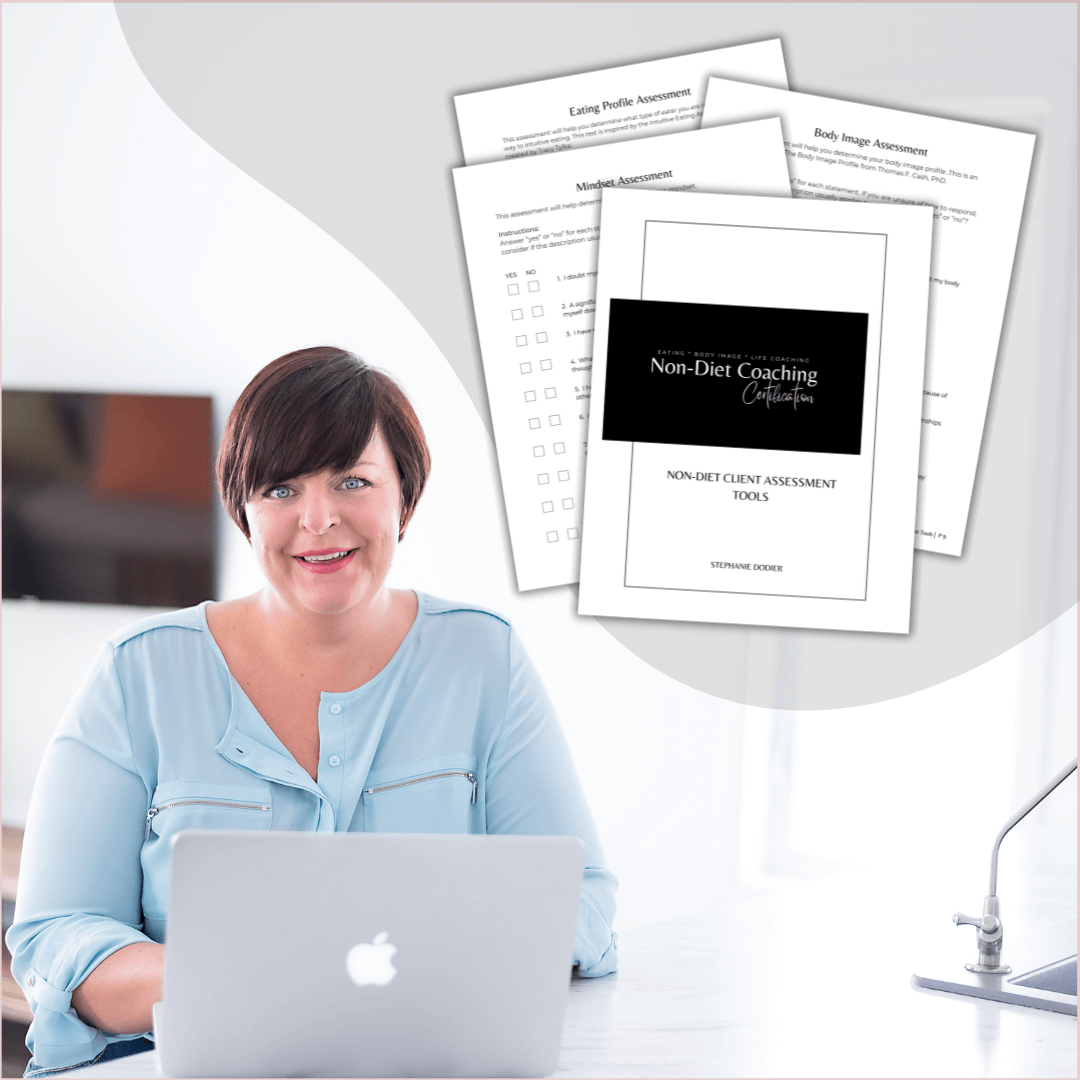

Shifting to a non-diet approach to health
Carolyn was the most impactful client-practitioner I have had to this day.
Not only did she triggered in me a must needed professional shift but also a personal transformation. So my quest for another way of serving my client and healing myself began with her.
7 years ago when I searched for support, training and non-diet coaching certification nothing existed. Instead, I read the Health At Avery Size® research and book by Dr. Lindo Bacon. And then began applying a weight-neutral approach to health in my practice.
Over the next 4 years, I collected both a variety of professional and personal skills. This collection of tools is today known as The Going Beyond The Food Method™️. And this non-diet methodology is currently taught in Undiet Your Life Coaching Program
The Going Beyond The Food Method™


The Going Beyond The Food Method™️ is a way of working with clients and patients which removes that emphasis and pressure to eat for weight loss or health. Instead, it embraces the Health At Every Size® weight-neutral approach to health, intuitive eating, body neutrality, mindfulness, and a self-coaching mindset.
This non-diet methodology respects the fact that each human has innate body wisdom. And that our the body knows what we need and what is best for us including food, eating, movement, weight, and self-care.
A practitioner who uses our methodology is focused on helping women rebuild a relationship of trust, respect, and neutrality with their bodies.The client is empowered to identify what will be best for her to optimize their own health and wellbeing.
At the core, a holistic based approach recognizing the 4 human bodies: mental, emotional, spiritual and physical human bodies. This non-diet approach for health coaches, nutritionists or any other health experts is a gentle process. And it focuses on skills building.
Ultimately, it’s about helping women conquer back their power and thrive unconditionally!
Intuitive Eating Mentorship
The Going Beyond The Food Mentorship program is an intuitive eating mentorship program, an anti-diet training and body image professional training. And it’s designed to support health professionals desiring to shift their practice to a non-diet model.
This is what I was seeking but couldn’t find years ago.
As a professional, a non-diet approach to health and nutrition can be scary as it empowers your client and patient to be their own health expert.
Non-Diet Coaching Professional Training
“If we are not going to hand out meal plans and “good and bad” food list, what will we do?”
That is a very common question and also a great starting point to understand which professional skills set will be required in a non-diet approach.
Food choices and healthy habits aren’t only derived from intellectual knowledge but also from our emotions and thoughts. This applied not only to healthy habits but to every habit we choose to do as a human.
As a non-diet practitioner, you will need to help with your clients with the mindset and emotional intelligence tools. We teach self-coaching for intuitive eating.
Chronic dieters and women who dislike their bodies are in their head instead of their bodies. You will need to help them come back into their body and to connect to their bodily sensation including their eating cues. Mindfulness is the perfect tool to cultivate body attunement.
Intuitive Eating Training
Intuitive eating is a well- researched and complete framework to help you reframe the before, during and after relationship to food with women. As a certified Intuitive eating counselor, I have studied directly with Evelyn Tribole and now included this empowering framework with all my clients in our non-diet online training.
As a non-diet professional, your skills wouldn’t be complete without a tool you can use to help your clients to heal their relationship with their body image.
Body Neutrality is the framework I have selected to teach in our program. It helps women understand that we aren’t defined by own physical bodies. This body image professional training goal is to respect and accept your body for what it is – and that’s it.
Non-Diet Business Coaching
Shifting your business to an anti-diet business model requires some small business adjustment mainly in the content of your professional services, health programs, and marketing.
Your intuitive eating business skills will require you to move to a serving message from selling messages. Your future client or patient will need to be educated about what is a non-diet and weight-neutral approach to health.
The 5-step process to build a successful Anti-Diet Business
1. Determine the non-diet business format that will support your personal goals
2. Define & refine your ideal clients and their needs
3. Create a non-diet service offer.
4. Market your offer or product using our exclusive non-diet transformation funnel system.
5. Deliver your product.
Bonus – Scale & Diversify
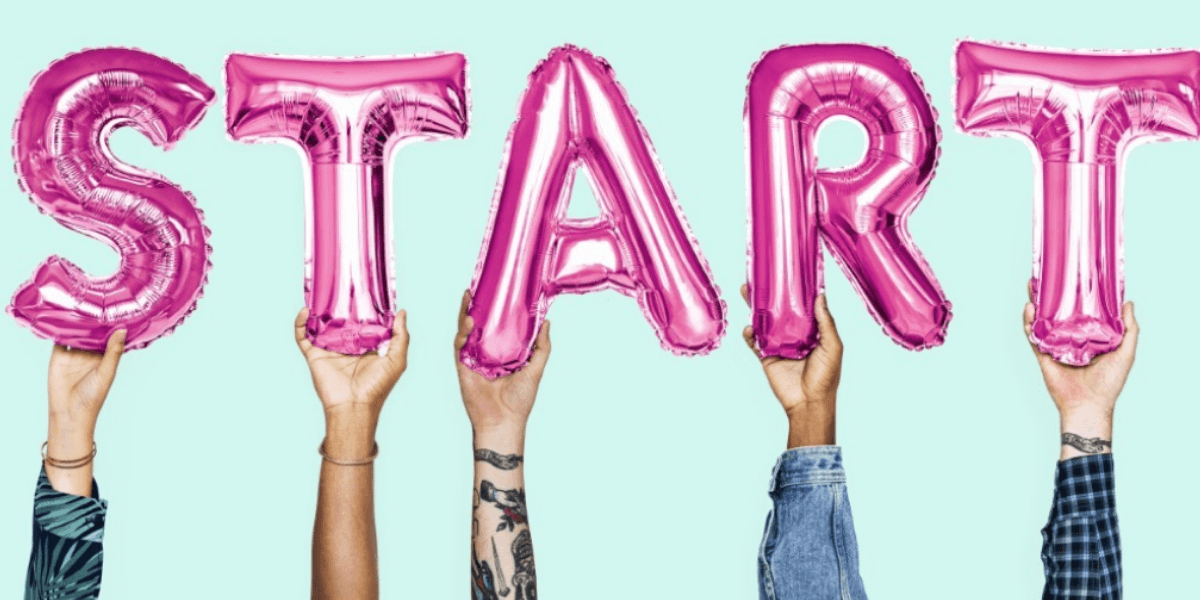

How to Get Started
We have created for you a number of free intuitive eating mentorship training resources to help you begin your research in the field of non-diet approach to health.
You can access this non-diet professional training by clicking here.
You will find non-diet online training, webinars, podcasts, and articles.
One last thing
Here’s the truth: As long as you teach any labelled diet (Keto, paleo, GF, DF, ….) and or handout food list and meal plan, you aren’t teaching sustainable health or nutrition. Point.
If the above is you, just about now you’re likely pissed at me. That’s ok sister! I get it. I was on the receiving end of this exact discourse about 4 years ago and I was mad but it planted a seed in my mind… and here I’m today!
It’s not your fault. As far as I know, today…no nutrition school or health coaching program currently offers Intuitive eating as part of their curriculum. So how were you supposed to know??
But now you know…. So, what will you do? Continue to arm people teaching diets or learn intuitive eating for yourself and slowly, gradually integrate it in your practice and help your client real sustainable changes.
It’s your choice. If you choose to opt-out of diet culture, we can help you in your journey.
We do not know what we do not know.
Most nutrition experts engage in disordered eating.
Individuals that develop disordered eating may at first initiate a quest for a healthier lifestyle but then dysfunctional, compulsive beliefs about food emerge that then impair health, work, and social functioning. If you are curious to know if have a disordered relationship to food then you should complete our free professional intuitive eating intake forms. Assess yourself and share your results with us!
Intuitive Eating Resources
I rounded up my best free intuitive eating resources, body neutrality resources, and Health at Every Size resources. It includes books, blogs, podcasts, programs, and courses.
Intuitive eating and body neutrality are increasingly becoming popular among women for a number of good reasons. For one, it’s been proven to lead to positive health outcomes. In addition, both are a healthy approach to health that puts you in control of your eating behaviours and body image.
Health at every size is the overarching weight-neutral health principle that drives the foundation of both intuitive eating & body neutrality.
This blog post is aimed at helping you discover intuitive eating resources to support you in your journey Going Beyond the Food: which means ditching diet culture, making peace with food and your body.
The meaning of Health at Every Size
My top 4 free intuitive Eating resources
Health at Every Size resources
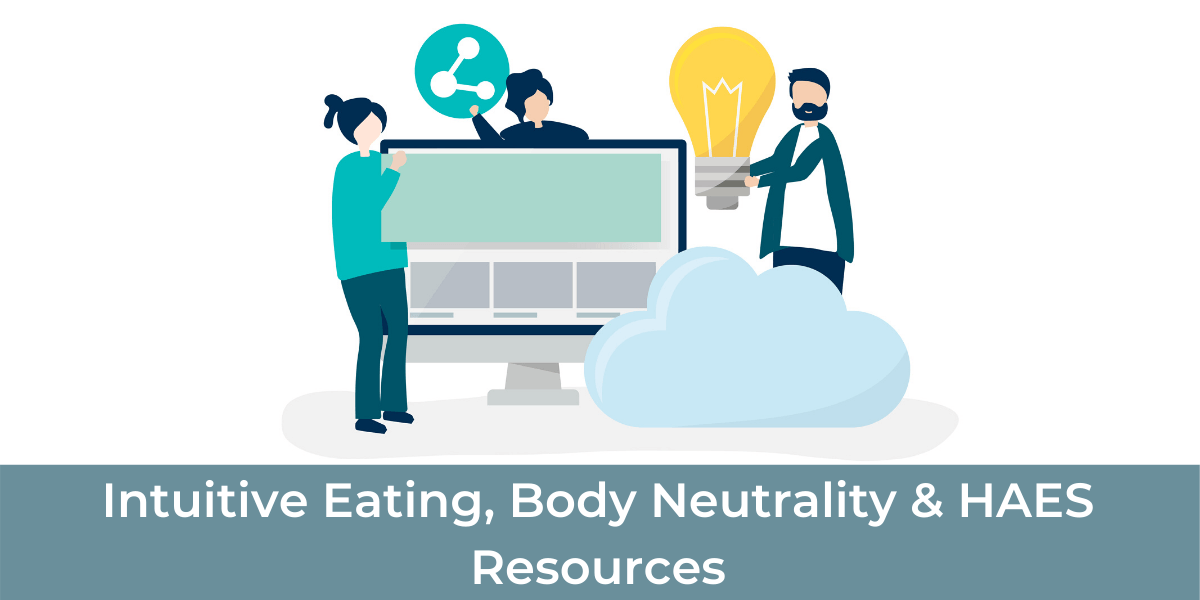

What is Intuitive Eating?
Intuitive eating is an evidence-based approach to eating that allows you to be the expert of your own body. And this self-care eating framework enables you to develop a healthy relationship with food and your body.
Moreover, it teaches you to trust your ability to meet your own needs, distinguish between physical and emotional hunger, and ultimately develop body wisdom.
Most importantly, eating intuitively is well–researched and proven health framework supported by more than 100 intuitive eating studies as of 2020.
What is Body neutrality?
Body Neutrality definition is about empowering you to embrace yourself as you are. That’s including the parts you don’t like about yourself. And its focus is to avoid self-hate while simultaneously relieving you from the pressure of having to love your body.
And the framework of Body Neutrality recognizes that not everyone is going to love every part of themselves all the time because that’s an unrealistic expectation, to say the least.
In short, the goal is to respect and accept your body for what it is – and that’s it.
What is Health at Every Size?
Health at Every Size definition is a philosophy and an approach to health. Linda Bacon, Ph.D wrote the book Health at Every Size: The Surprising Truth About Your Weight.
The book demonstrated through health at every size research and studies that health behaviours influence health more than weight.
Above all, the HAES movement promotes the simple truth that all bodies are good bodies. It shifts the focus away from dieting for weight control.
Instead, it steers you toward self-care practices that support your body’s natural wisdom and vitality.
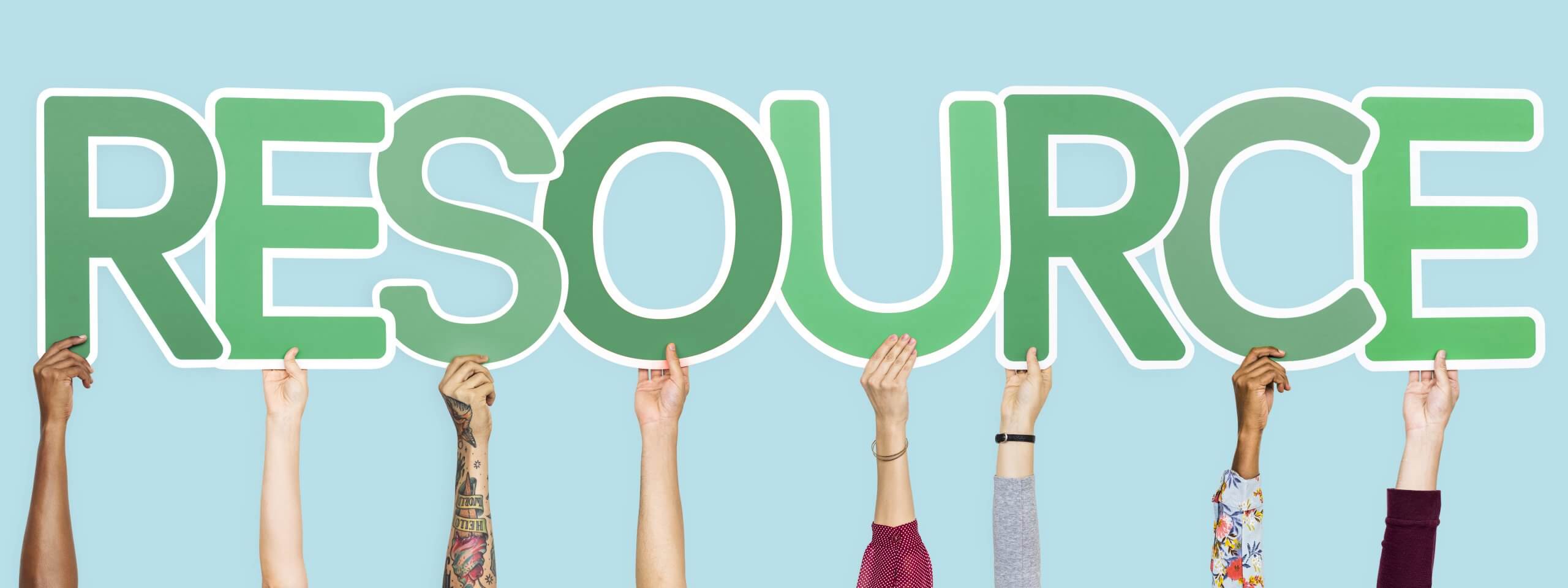

My top 4 free intuitive eating resources
#1 The Going Beyond The Food Show
This is my intuitive eating podcast. A collection of 200+ episodes that cover all topics about intuitive eating, body neutrality, and health at every size.
I suggest you get started at show 199 and move your way up!
#2 Health at Every Size Manifesto
A free HAES guide is provided by Dr. Linda Bacon. And it explains the Heath at Every Size approach to health and provides sustainable research-based evidence that demonstrates that health is accessible at any body size.
#3 Beauty Redefined
Beauty Redefined is a non-profit, dedicated to promoting positive body image online and in live speaking events. This website is run by identical twins Lexie Kite, Ph.D. and Lindsay Kite, Ph.D.
These two experts teach body image resilience through research-backed online education available on their website, and social media. Visit their blog and TEDx Talk.
#4 Get Started Guide
I created this free guide to help women understand the basics of intuitive eating. Most importantly, this guide is followed by a series of educative articles to help you to get started on this new journey.
Get the FREE guide here.


Intuitive Eating Resources
There are 3 levels of resources for you if you are ready to learn intuitive eating.
#1 Intuitive Eating Books
Evelyn Tribole is the ultimate intuitive eating expert, my teacher, and my mentor. She has dedicated her career to training health professionals with the intuitive eating framework.
All of our programs at Going Beyond The Food are certified by The Original Intuitive Eating Pro®.
#2 Structured Online Intuitive Eating Program
The Intuitive Eating Project is a 5-week online program.
In addition, it is a self-study program to teach you Intuitive Eating in an easy step by step, supported by an online community, and dozens of videos, guides and integration exercises. And it’s lead by myself, Intuitive Eating Expert, Stephanie Dodier CNP.
#3 Intuitive Eating Program Private Counselling
Two options for you:
#1 If you want to work with a local intuitive eating certified counsellor, then, you can visit this directory to locate someone to work with you 1-on-1.
#2 You can visit this intuitive eating coaching page on my website. Not only will you be able to read more on my coaching programs but also submit your application if you would like to work with me 1-on-1.
Most importantly, my 1-on-1 coaching is inclusive of body neutrality and health at every size alongside with intuitive eating.
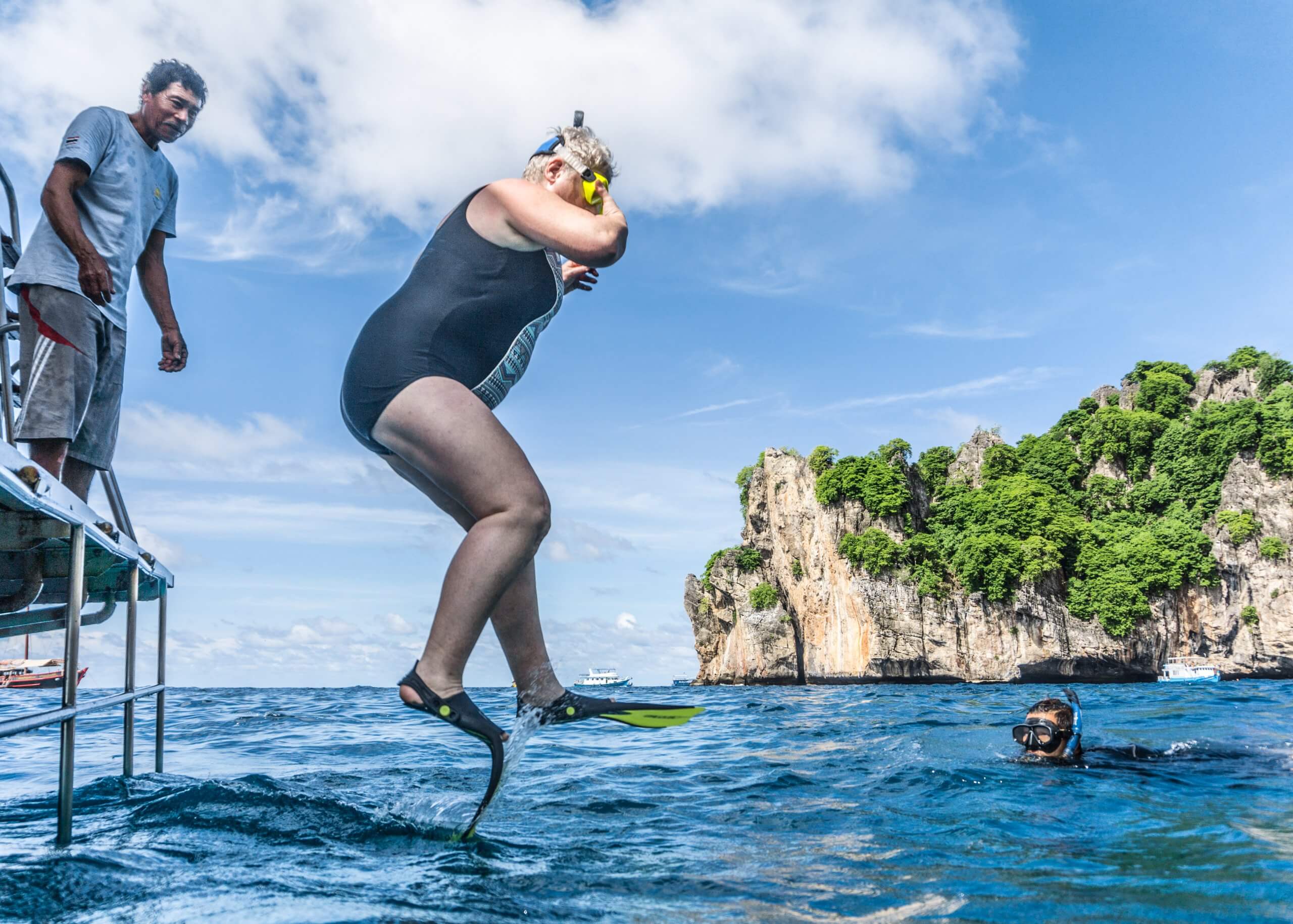

Body Neutrality Resources
Are you ready to get started making peace with your body? Then, there are 3 levels of resources for you.
#1 Body Neutrality Books
I would suggest starting reading books. Things No One Will Tell FAT Girls by Jess Baker is a lived-experience book combined with research. This book was a game-changer!
The second book you should read is definitely The Beauty Myth: How Images of Beauty Are Used Against Women by Naomi Wolf. This is a classic that redefined the relationship between beauty and female identity. Body image issue is a feminist issue! Must read for all women.
#2 Body Image Courses & Programs
I would suggest two online programs. Both of these programs are a step by step structured program to heal your body image and make peace with your body.
#1 Beauty Redefined Body Resilience Program. A 8-week program to build body resilience by helping you navigate body shame, objectification, and unreal ideals.
#2 The Body Image Accelerator, this is my baby. A 5-part online program to help you accept your body using the body neutrality framework.
#3 Body Image Private Counselling
Two options for you:
#1 Jess Baker is a Recovery Support Specialist with a long history working as a Psychosocial Behavioral Specialist. With both formal education background and lived experience I’m pleased to recommend Jess. You can find more about working with her here.
#2 Would you like to work 1-on-1 with me? You can visit this intuitive eating coaching page on my website. Not only will you be able to read more on my coaching programs but also submit your application if you would like to work with me 1-on-1.
My 1-on-1 coaching is inclusive of body neutrality and health at every size alongside with intuitive eating.
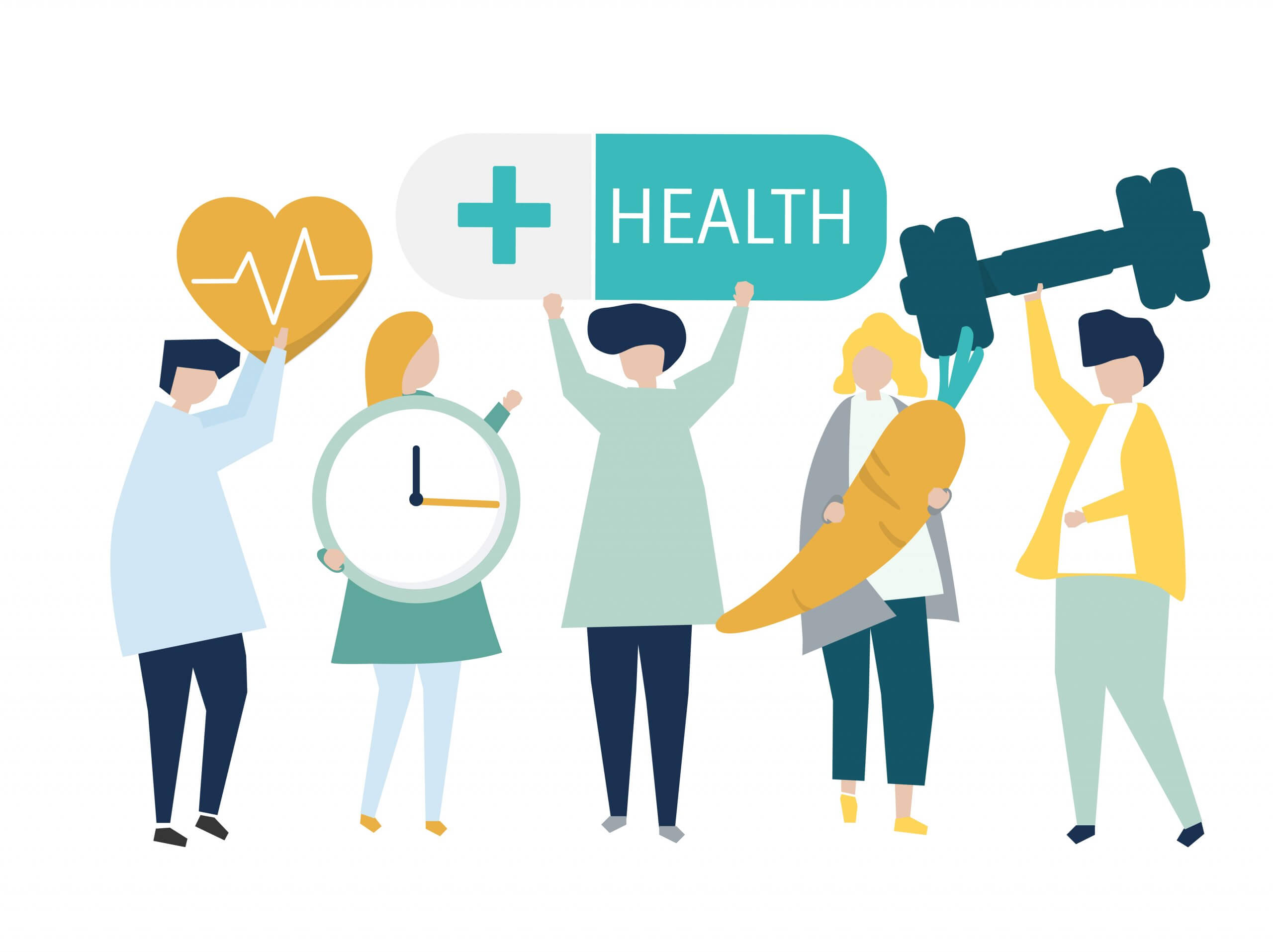

Health at Every Size Resources
Ready to relearn health and adopt a weight-neutral approach to health? I have a few options for you. Three levels of resources for you:
#1 Health at Every Size Books
The first place to get started is to read Dr. Linda Bacon’s Health at Every Size: The Surprising Truth About Your Weight. Think of this book as the bible of the weight-neutral approach to health.
Next, I would suggest my colleague, Christie Harrison’s book Anti-Diet. Her book is very well researched and structured for you to understand why health is available to you now!
#2 Health at Every Size Course
If you are looking for a step by step structured program to teach how to support your health in a weight-neutral holistic methodology…
Going Beyond The Food Health Mastery is a 9-module curriculum. And this program will teach you how to support your body towards the best health without having to lose weight. Not only without restricting food or taking any supplements! This program is taught by myself, Stephanie Dodier CNP.
#3 Health at Every Size Private Counselling
Want to work with a Health at Every Size care provider? You can visit this directory to locate someone to work with you 1-on-1.
[sc_fs_multi_faq headline-0=”h2″ question-0=”What is Intuitive Eating? ” answer-0=”
Intuitive Eating definition is an evidence-based approach to eating that allows you to be the expert of your own body.
This self-care eating framework enables you to develop a healthy relationship with food and your body.
Teaches you to trust your ability to meet your own needs, distinguish between physical and emotional hunger, and ultimately develop body wisdom.
I hope this helps sister!
Intuitive Eating Coaching
All women that come to intuitive eating coaching have failed… failed at many diets.
I love when women’s diets do not go according to plan… I get really excited because I know they are on the brink of huge transformation.That’s when you are forced to make a choice… stay in your comfort zone repeating your old patterns to jump on the next “new” diet…OR move forward past your dieting comfort zone and towards something different.
That’s when I come in… helping you feel the fear of trying something different and still move forward with courage.
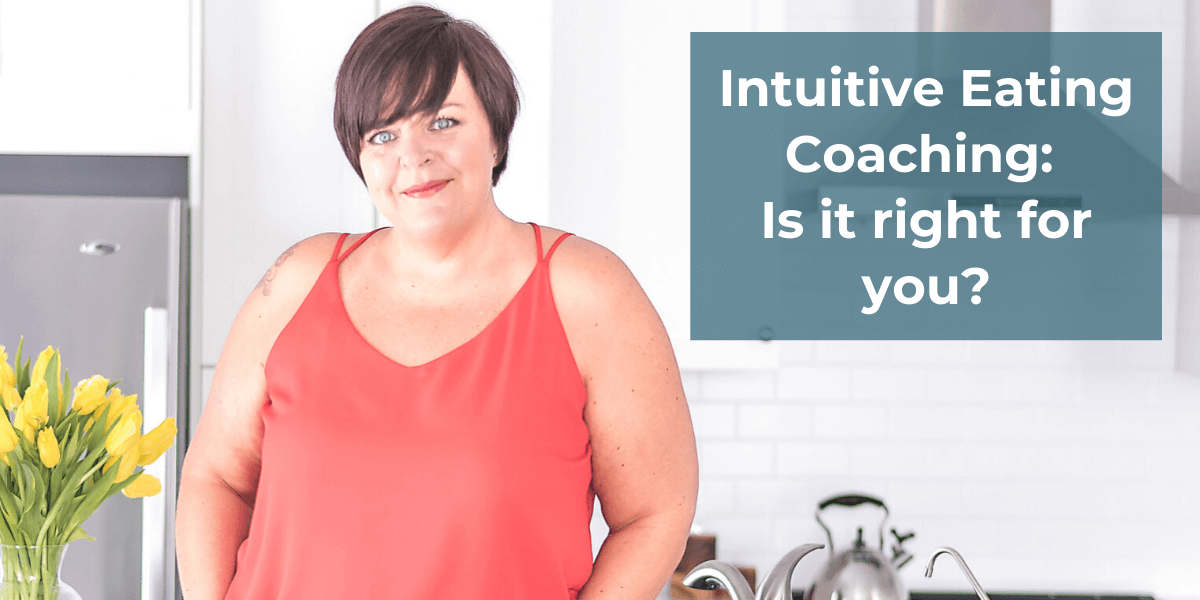

What is intuitive eating coaching?
How do you teach intuitive eating?
Can intuitive eating really work?
What is intuitive eating?
Intuitive eating is a proven and well-researched self-care eating framework that teaches us to have a healthy relationship to food, empowering you to trust your ability to meet your needs, distinguish between physical and emotional hunger and ultimately develop body wisdom.
The intuitive eating definition is a framework to recover from years of chronic dieting and diet culture. And it’s focus is on rebuilding a relationship of trust and respect towards your body while supporting your health and happiness.
Our unique approach, The Going Beyond The Food Method uses the frameworks of body neutrality alongside to intuitive eating and cognitive behavioral coaching. We integrate body image coaching along with intuitive eating specifically body neutrality has a a focus to avoid self-hate while simultaneously relieving you from the pressure of having to love your body. I shared the foundation of this approach since 2016 in my intuitive eating podcast, “The Going Beyond Food Show”
What is intuitive eating coaching?
That’s when me and my team comes in.
Over the last 8 years I have created the Going Beyond The Food Method, created and develop the curriculum of Undiet Your Life Coaching Program. Over in the last 3 years I focus my work on creating The Non-Diet Coaching Certification a program uniquely developed to train health professionals in the Going Beyond The Food Method. A number of graduates from the Non-Diet Coaching Certification are part of my coaching team at Beyond The Food along side with me as the lead Certified Non-Diet Coach.
As your partner, your Certified Non-Diet Coach a non-diet coach will support you in understanding and removing what is in the way of you becoming an intuitive eater. And what is in the way of your life without food and weight obsession Beyond The Food.
Your Non-Diet Certified Coach will challenge you to say “no” to going through the old patterns and enthusiastically say “yes” to the possibilities that are available to you with intuitive eating and body neutrality.
The journey of intuitive eating coaching
The journey begin by taking an overview of your life and dieting history and identifying areas that need action and/or attention. Then your Certified Non-Diet Coach will complete a series of assessment on your eating habits, body image and mindset.
Then you Certified Non-Diet Coach will assist you in establishing clear, concrete, measurable goals and support you in deploying a plan to achieve these goals. There is no old habits, patterns you cannot shift when coached by a professional coach. You are capable of so much more than you know or are currently creating.
At Beyond The Food we do not believe there is a one-size-fits-all approach when it comes to 1-on-1 coaching. We create a unique strategy for you, individualized based on your past, specific needs and goals. Your Certified Non-Diet Coach responsibility is to guide you and supporting into solving the roadblock as they come along the path to your goals and keep your moving forward when you want to quit.
We listen with understanding and 100% confidentiality. Our relationships with my clients are intimate, honest, and rewarding. As we move closer to your goals being acheive the relationship with your coach will naturally evolve in a way that best supports you.
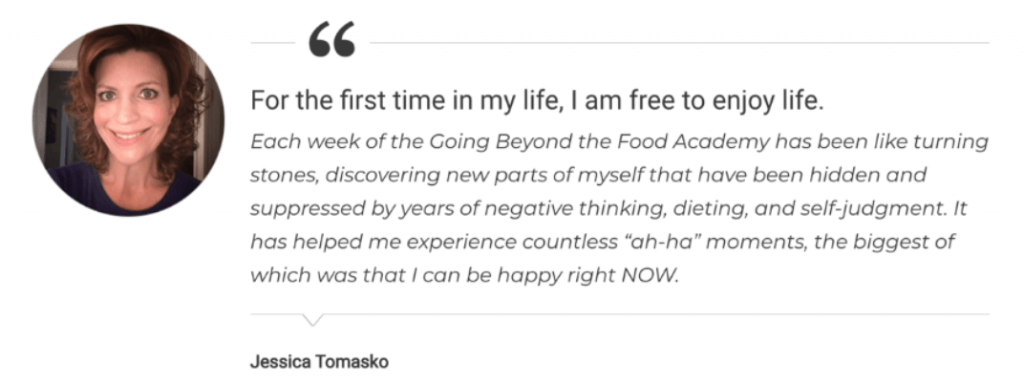

How do you teach intuitive eating?
Our work together is organized following my proprietary methodology The Going Beyond The Food Method™️. As an intuitive eating coaches, the outcome of our work together is a neutral relationship of trust and respect towards your body and its innate wisdom.
Our approach is unique for many reasons. We teach intuitive eating & body neutrality through the lenses of a lived experience combined with a holistic and science-based lens.
If you’d like to get a sense of my journey, as the founder of Beyond The Food Method read this article I wrote: Intuitive eating before and after: my story.
Can intuitive eating really work?
Here’s the most fascinating aspect of intuitive eating and body neutrality, it’s that you can’t fail. You can’t fail because it’s not a diet! And because I’m confident in myself and not afraid to sign my own praise… here’s why women love my coaching:
“This experience was life-changing and worth every penny!”
So first thing, know that I’m sharing my experience being an executive coach myself… and I’ve worked with dozens of global coaches personally and professionally. Coaching with Stephanie was life-changing forever and worth every penny you’ll put into it. – Anna Buber Farovich
“My work with Stephanie led me through a massive transformation!”
Stephanie is kind, inspiring and her knowledge and experiences helped me to sort out some issues I was not sure about and led me through a massive transformation both personally and in my business.- Hanka Valaskova
“Stephanie has really changed my life. I’ll never go back to the way it was…”
I’m in the Board of Directors and have a very busy lifestyle, but Stephanie’s coaching on perspective on life, lifestyle and dealing with our food issues has really changed my life. I don’t think I’ll ever go back to the way it was.–Eithne Wait
You can access more videos, audio and written testimonials here.
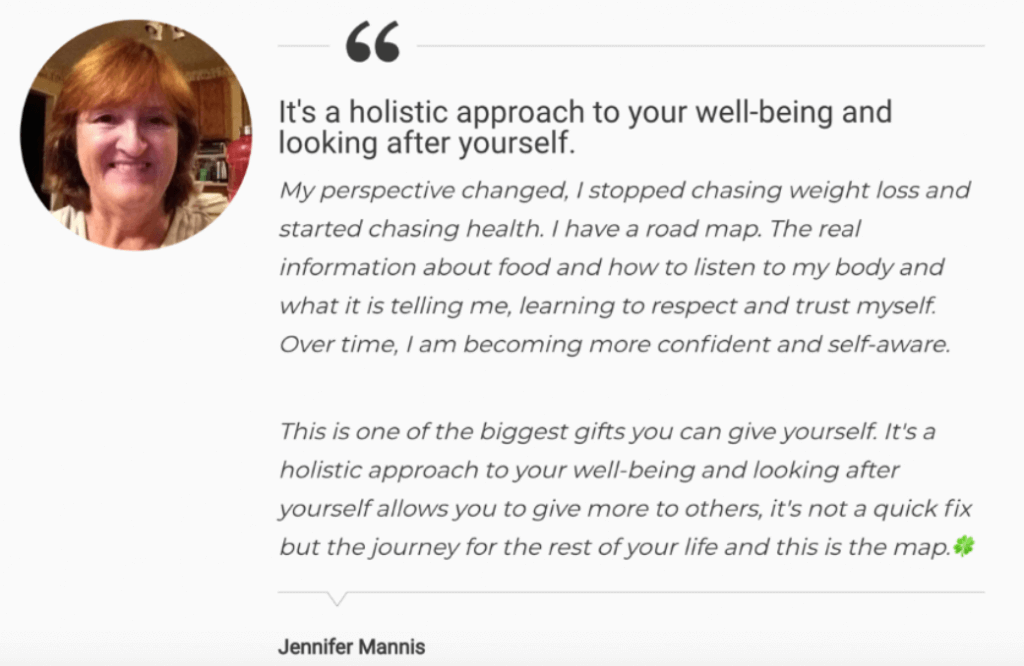

How do I get started?
You can access all of our services on our work with us page. We have a number of programs and service levels enabling us to serve most women:
Free Resources and Masterclasses: Get started and get to know us better!
Private coaching with Stephanie and her team Stephanie and her team of Certified Non-Diet Coaches are waiting to support you in a one-to-one setting with an individualized plan.
Undiet Your Life group coaching program is for women to learn how to eat intuitively, become body neutral, and learn self-coaching at their own pace while being supported in a group setting by Stephanie and her team of Certified Non-Diet Coaches.
Non-Diet Coaching Certification for professionals ready to integrate the Going Beyond The Food Method™️ in their practice and for women wanting to become Certified Coach and build a business coaching other women beyond the food.
How can I know if I’m the right fit for intuitive eating coaching?
If you’ve been on and off diets for longer than you like to admit, think your life will start when you finally lose the weight, while you eat emotionally, binge and hate your body: This is for you!
I had the opportunity to coach Ashley Dorough from The House of Dorough in the context of her blog and she filmed part of our session. I would encourage you to listen to the part of her first session. If you’d like to see more videos visit her IGTV account.
Part 1 – Is this your story too? -Click to watch
Part 2 – Why it’s beyond
I’m really busy now how will I find the time?
Well, that’s part of the journey. Discovering what is holding us back from having the time to take care of ourselves. The truth is, there’s never going to be enough time. Diet brain keeps you stuck in your patterns and cycle because you are waiting for the right time when you can do it all perfectly.
Listen to Ashley describe her self-care story… and my coaching.
Will I lose weight during the intuitive eating coaching process?
Well, that’s part of the journey. Discovering what is holding us back from having the time to take care of ourselves. The truth is, there’s never going to be enough time. Diet brain keeps you stuck in your patterns and cycle because you are waiting for the right time when you can do it all perfectly.
Listen to Ashley describe her self-care story… and my coaching.
Will I lose weight during the intuitive eating coaching process?
First, know that it’s completely normal for you to want to lose weight. We live in a society that is filled with weight stigma and thin ideal. That’s diet culture. Intuitive eating and body neutrality goal aren’t to help you lose weight. If you are focused on weight loss, it will actually undermine the process. While some people lose weight, others don’t. Our journey together is not about weight loss.
Listen to Ashley asking me “Is it ok if I want to lose weight?” … and my coaching.
If would like to access more science-based information on this topic visit these 2 articles on my intuitive eating blog: Health beyond dieting and Intuitive eating & BMI.
I have tried so many diets will intuitive eating coaching work?
Good news, it’s not a diet. Diets have a 91-95% failure rate on 3-5 years’ timeframe so no surprise it didn’t for you either. Dieting leads to weight gain. This process is completely different from dieting because the goal is not weight loss, it’s about learning to appreciate our body and rebuild a relationship of trust and respect with ourselves and our body.
Listen to Ashley and me answering the question “If it’s not about weight loss then what is it about?”
Why can I just do one session with you?
How long did it take you to get here? 1 hr or 10, 20, 30 years? I know for me it took 25 years and hoping to undo it all in 1 hour kept me stuck. The fear of commitment is in part the way in which your Diet brain operates to keep you stuck. Committing your time, energy and resources, your own transformation is part of the learning. If this is too much for you now, consider the environment of intuitive eating group coaching where we use the same methodology but no direct interaction with me.
The Ultimate Guide to Intuitive Eating and Diabetes
At first glance, integrating intuitive eating and diabetes management may seem counter-intuitive. And for many reasons, most approaches to managing diabetes are based on weight loss and carbohydrate life-long restriction.
But there’s a major problem with these two approaches: a massive failure rate and unsustainability long term. As of today, diabetes is a noncurable disease, requiring that requires a treatment plan that can be maintained for the rest of your life. Unfortunately, dieting has a failure rate in a 2-5 years period.
And that’s when a weight-neutral approach to diabetes comes in!
Diabetes and weight-neutral approach to health
Switching from judgment to curiosity with food
Free Audio Guide to intuitive eating and diabetes
Intuitive Eating free mini-course
Diabetes Specific free resources
Diabetes and weight-neutral approach to health


A weight-neutral approach to health is based on the idea that your health status or risk level can’t be determined solely by your weight.
Moreover, it acknowledges that your weight is determined by a complex set of genetic, metabolic, physiological, cultural, social, and behavioural determinants. Many of these factors are either difficult or impossible to change.
Instead of focusing on a weight-oriented outcome to the management of diabetes, weight-neutral programs teach you to take charge of the factors that can help diabetes within your control.
So taking charge of these factors among many others will help you improve your well-being and management of diabetes regardless of your weight.
Here are just a few of these factors:
1. Stress management
Stress is an important contributor to pathological conditions in humans. And hormonal changes that occur during acute and chronic stress situations can affect glucose homeostasis. In fact, a large body of evidence supports an association between stress and hyperglycemia (diabetes).
2. Weight stigma
The experience of discrimination and stigma around one’s body has a direct influence on health behaviours and stress levels. And research is pointing at weight stigma as a major contributor to health outcomes including diabetes.
3. Movement
Consistent gentle & enjoyable body movement has proven time after time to reduce blood sugar dysregulation. Moreover, the recommendation from the American Diabetes Association is clear on the benefit of all forms of diabetes.
4. Body Dissatisfaction
Internalize weight stigma leads people to become increasingly dissatisfied with their bodies and make poor health decisions.
And a 2013 study published by the Journal of Obesity found no link between body weight and the way women feel about themselves. However, the findings show a link between how women feel about themselves and their health behaviours. In other words, the better they feel about their bodies, the more likely they are to take care of themselves leading to a better health outcome.
What is intuitive eating


When people ask what eating intuitively means, this is the definition that usually comes to mind: “a self-care eating framework that uses your body’s internal cues of hunger, fullness, and satisfaction to guide your eating behaviour.” It’s literally trusting your gut! Note that this intuitive eating definition emphasizes self-care and not weight loss.
Intuitive eating, an evidence-based approach to eating that allows you to be the expert of your own body. So this approach enables you to develop a healthy relationship with food and your body. And it teaches you to trust your ability to meet your own needs, distinguish between physical and emotional hunger, and ultimately develop body wisdom.
And eating intuitively is a well research process and proven health framework supported by more than 100 intuitive eating studies as of 2019.
Nutrition and Diabetes
There is no doubt that what we eat influences our blood sugar. And it’s a known fact that carbohydrates will increase our blood sugar level . However, not all carbohydrates have the same influence on the level of blood sugar.
Furthermore, studies are showing that individuals’ blood glucose levels respond very differently to different foods. So this is what we call bio-individuality. In other words, there’s no one “diabetic diet” for every person diagnosed with diabetes. And while there are definitely generalities with eating and lifestyle that can be helpful, there isn’t a one fit all approach.
An individual needs to explore what works for them and what doesn’t for them. So as life unfold the individual reaction to certain food will also vary and change with time.
This is how intuitive eating is the perfect approach to diabetes.

Switching from judgment to curiosity with food
Intuitive eating is part of a Health At Every Size™️ approach to diabetes and a global weight-neutral approach to health.
Intuitive eating will teach you to become curious about how certain food makes you feel. And to pay attention to how your blood sugar is post-meal, be attentive to how you feel after eating, and your overall level of energy.
Being an intuitive eater will allow you to engage with food objectively without judgment. So it puts you back into power when making your food choice. And it helps you build trust and respect for your body instead of fear and hatred.
Intuitive eating is really about switching to love instead of fear when it comes to food and diabetes.
Audio guide to Intuitive Eating and Diabetes
This audio guide (podcast) is a collaboration with two of my colleagues. Both are experts in the treatment of diabetes under the lens of Health At Every Size and Intuitive Eating.
Rebecca Scritchfield is a Washington DC-based Registered Dietitian Nutritionist and Certified Exercise Physiologist. And she has been practicing weight inclusive, HAES care since 2008. Also, Rebecca is the author of the book Body Kindness and the host of the Body Kindness podcast.
Glenys Oyston is a Los Angeles-based Registered Dietitian Nutritionist. And she has been practicing a HAES® philosophy since 2010 and has provided extensive diabetes education for the past five years. Also, Glenys is the co-host of the Dietitians Unplugged podcast.
What we cover in this free audio:
- Is weight loss the solution to treating diabetes ?
- 5 most frequent myths about diabetes debunk
- The Health At Every Size approach to treating diabetes
- Where to find resources to integrate a non-restrictive approach to preventing and treating diabetes.
Diabetes Specific Resource
Dr. Lindo Bacon has written a guide to help people navigate the journey of integrating the Health at Every size principle in their approach to diabetes management. You can access this free Health At Every Size guide here.
My colleagues Rebecca Scritchfield & Glenys Oyston both registered dietitians who know that self-care for diabetes doesn’t have to involve restriction and weight loss have created an education & support group. The Health at Every Size® (HAES®) Care for Diabetes education and support group can be accessed here.
Get started – Next steps
Are you are ready to learn more about how you can approach your health with a weight neutral lense?
You can access all of our services on our work with us page. We have a number of programs and service levels enabling us to serve most women:
Free Resources and Masterclasses: Get started and get to know us better!
Private coaching with Stephanie and her team Stephanie and her team of Certified Non-Diet Coaches are waiting to support you in a one-to-one setting with an individualized plan.
Undiet Your Life group coaching program is for women to learn how to eat intuitively, become body neutral, and learn self-coaching at their own pace while being supported in a group setting by Stephanie and her team of Certified Non-Diet Coaches.
Non-Diet Coaching Certification for professionals ready to integrate the Going Beyond The Food Method™️ in their practice and for women wanting to become Certified Coach and build a business coaching other women beyond the food.
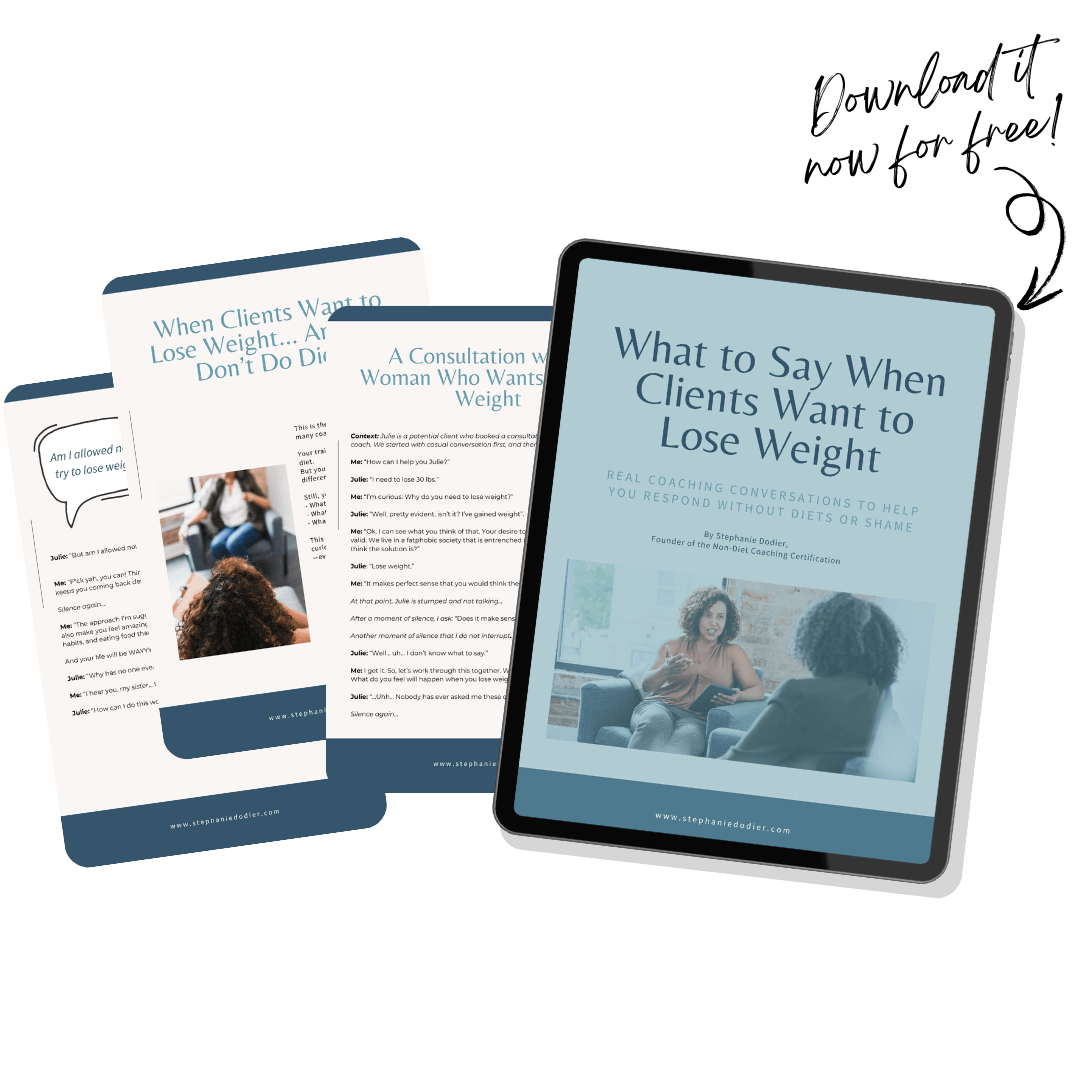

FREE GUIDE
What to say when a client want to lose weight
GET THE EXACT WORDS I USE IN REAL COACHING SESSIONS—WHEN WEIGHT LOSS COMES UP AND I’M HOLDING A WEIGHT-NEUTRAL STANCE


FREE GUIDE
What to say when a client want to lose weight
Get then exact word I use in real coaching session when weight loss comes up and I’m holding a weight-neutral stance
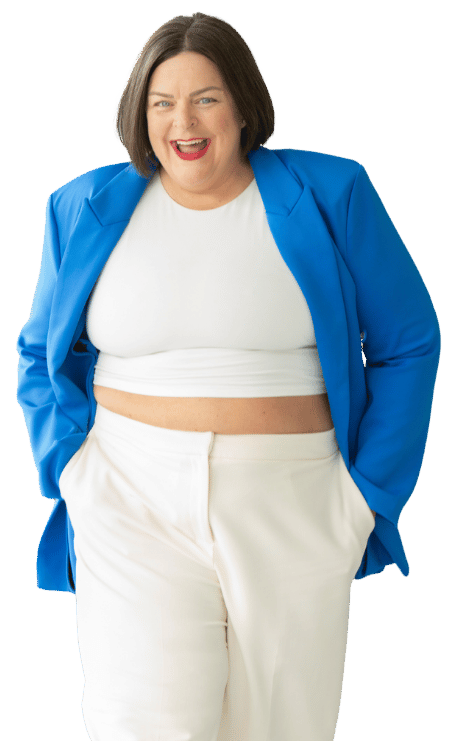

Welcome!
I’m Stephanie Dodier
I am a non-diet nutritionist, educator, and feminist business leader challenging everything we’ve been taught about food, health, and coaching.
I help health professionals confidently coach food and body without co-opting diet culture.
Join me in leading the health coaching revolution!
Ready? Let’s do this!

